#its very important to me how particularly the first series was born out of supporting adhd children
Text
Fun fact! The reason the demigod camp colors are orange and purple specifically is because those are the ADHD awareness colors!

notice the specific shades? those are our t-shirt colors!
Orange is more common for adhd awareness ribbons (thus why it’s used for CHB, the camp we’re first introduced to), but purple is also sometimes used as well (thus why it’s the color of the second camp introduced)! There are even some ADHD pride flag designs that utilize one or both colors.
I’ve also rarely seen ribbons that combine both colors, with one half being orange and the other half being purple.
#pjo#percy jackson#chb#Camp Half-Blood#camp halfblood#i swear ive made a post about this before but i cant remember. anyways ye#i was randomly reminded about this and that it isnt common knowledge but i think its a cool detail#its very important to me how particularly the first series was born out of supporting adhd children#and that's woven into it so deeply! you miss and lose so much when you remove that!#you cant analyze the first series without acknowledging how much of it was built on adhd awareness#albeit early 2000s adhd awareness so some of it is now outdated but still! its so central to the books!#it shapes the worldbuilding and characters so much!#adhd
1K notes
·
View notes
Photo
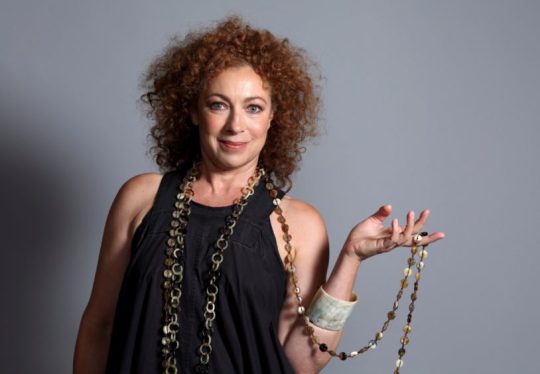
“Certain actors have a reputation for being difficult. I don’t want to be one of those people”. - Alex Kingston
INTERVIEW: The Sunday Post
It comes as no surprise to Alex Kingston that her daughter has decided to follow in her footsteps, despite her best efforts to temper her acting ambitions.
The actress fell pregnant with Salome, now 19, when she was playing surgeon Elizabeth Corday on the long-running US medical drama ER in the ’90s.
Alex’s pregnancy was written into the script and Salome, whose father is German writer Florian Haertel, was just weeks old when she joined the cast as Elizabeth and Dr Mark Greene’s baby girl.
Now, two decades on, mother and daughter are working together again, this time in a Doctor Who spin-off audio drama, The Diary Of River Song. Now in its eighth series, it focuses on the Time Lord’s brilliant wife, the poetically named River Song, whom Alex has played on the TV show since 2008. Salome, meanwhile, plays the part of her synthetic humanoid companion, Rachel.
Alex said: “My daughter was in my belly on ER then played the role of our baby girl Ella Greene. She’s secretly always had the desire to act, but I was always adamant that she finished her education first.
“Salome plays a character who River Song meets up with occasionally and they have adventures together. Working with my daughter has been terrific fun. I am super-impressed with her. She is incredibly professional.”

© Big Finish
Alex with daughter Salome
For the past year Alex and Salome have been isolating together at her London home, alongside Alex’s third husband, television producer Jonathan Stamp. The pair married in an intimate Italian ceremony in 2015, and Salome was a bridesmaid.
They are joined by Alex’s German-born mother, Margarethe, who sadly suffers from dementia. It sounds like a potentially stressful set-up but Alex has cherished the unexpected extra family time lockdown gifted her.
Alex, who celebrated her 57th birthday a few days after the first lockdown was announced last March, said: “My daughter had arrived from New York and decided she wanted to live with us. Then my mother, who has dementia, suffered two strokes early on in lockdown and she moved in as well. So I was her carer.
“It was an amazingly special time. And I cherish it. Particularly with my mother, because I wouldn’t have had that opportunity otherwise.”
Like the rest of us, Alex has relied heavily on streaming services to keep her entertained during the long days spent at home. She even broke her self-imposed rule of not watching her own stuff on screen.
She said: “We did all the usual things, massive clear-outs, and of course binge-watched TV. I loved Schitt’s Creek, Call My Agent, Bridgerton and Luther. I can’t bear to watch myself on the television. However, I started watching ER, because it was streaming on Channel 4. I look at myself and it’s like I am watching someone else. It’s such a good show, and it’s really held up!”
She added: “As much as everyone is saying this is the year that they want to forget, I actually feel it’s a year one can never forget. It certainly wasn’t an easy time. However, I have much stronger memories of the year, and of the patterns of the year than I have ever had pre-pandemic, when there was always so much rushing around.”

© Paul Drinkwater/Warner Bros Tv/Amblin TV
Alex in 1994 with fellow ER cast members (l-r) Anthony Edwards, Eriq La Salle, Goran Visnjic, Noah Wyle
Alex began her career at the Royal Academy of Dramatic Art, where she met her first husband, Skyfall actor Ralph Fiennes. They were together for 10 years before marrying in 1993. Two years later, Alex was left bereft when Fiennes left her after an alleged affair with a co-star. The London-born actress has barely stopped working since she first appeared on UK screens in 1980, as Jill Harcourt on the iconic children’s series Grange Hill. She continued to find success in UK dramas including Upstairs Downstairs, and The Fortunes And Misfortunes of Moll Flanders.
She first appeared in the fourth series of Doctor Who alongside David Tennant in 2008. Alex thought it was a one-off but has reprised the role in 15 episodes between 2008 and 2015.
It’s thanks to her Doctor Who appearances and, more recently, Sky’s hit supernatural drama, A Discovery Of Witches, that she has become known to a new generation of fans.
During her long and successful career, Alex has never been afraid to call out sexism in the industry. When she was dropped from ER aged 41, after seven seasons, she accused producers of ageism. saying “Apparently, I, according to the producers and the writers, am part of the old fogies who are no longer interesting.”
Then, when she auditioned for the role of Lynette Scavo on Desperate Housewives which eventually went to Felicity Huffman, she says she was turned away for being too curvy.
Although vocal about the challenges that face women, she admits she has seen positive changes in attitudes towards female talent in recent years.
She says: “When I was working on ER, I thought that I wasn’t allowed to get pregnant, I didn’t want to offend the producers as that is not what they had intended. I thought that I would have to ask permission. It was Anthony Edwards, who played my on-screen husband, who said ‘Don’t be ridiculous, don’t wait for them to allow you, you are not that important. If you want to have a child, go and have a child, and they will find a way to work round you.’ So I took his advice.
“I grew up with this notion that one had to be polite and always ask for permission. Whereas this generation don’t. They just get up and do it. The lovely and talented Teresa Palmer, whom I work with on A Discovery of Witches, is constantly popping out babies. Production just work around her. And it’s great, I admire her very much for that.”

© Chris Haston/Warner Bros Tv/Amblin TV
Alex in ER
Alex puts her staying power down to being in the right place at the right time – and being nice to people, though she says theatre will provide her with a safety net should the TV work dry up one day.
She said: “Being as versatile as possible helps. I’m up for anything as long it is written well.
“I had a formal training. My first love is theatre. Having that as a backbone will always support me. In an industry that will favour youth more, theatre is always there. In order to succeed on the stage you have to have had good solid training and know how to handle your voice.
“Also, being a nice person counts for a lot. If you were difficult you would get a reputation. Of course there are actors who are extremely difficult and tiresome to work with, and there will come a point at which you think is it worth it? I don’t want to be one of those people.”
Despite her time-travelling credentials Alex has no idea what the future holds but still harbours a dream of being a Bond Girl (though obviously not one who falls for the smooth-talking spy).
She laughs: “I would love to be a villain in a James Bond movie, the real villain, the main one. Because they’ve never had a female villain. And I want to be a villain who does not find James Bond sexy at all. And doesn’t succumb to his charms, I want to be his real nemesis.”
Time for a return to Tardis?

© PA / BBC
Alex alongside Peter Capaldi in Doctor Who
From ER to the Tardis, Alex’s career to date has been distinguished by roles opposite fictional doctors, whether medical or time-travelling.
The smash-hit hospital drama which made her a star in the ’90s famously launched the Hollywood career of a certain George Clooney. Then in 2008, Alex won a new generation of fans as the wife of Doctor Who.
Because the Doctor transmutates over time Alex, as River Song, gets several leading men for the price of one. Alex said: “Essentially my character is the same, so there’s continuity there, and the fun is interacting with someone who is essentially the same man, but in a different skin and with a different energy.”
Perhaps the least lucky man in the role was Matt Smith.
Alex explained: “One of the most memorable parts of filming was when I flew through the universe, got caught in the Tardis and kneed Matt Smith, who was playing the Doctor at the time, in a sore place by mistake. There were a few tears of laughter from me and cries of pain from him.”
Speculation is rife among fans that Alex will return to the Whoniverse, if the incumbent Time Lord Jodie Whittaker steps down. All Alex will say is: “My Tardis door is always open…” [x]
#Alex Kingston#Salome Haertel#River Song#Doctor Who#Kingston Edit#ER#NEW#Interview#2021#The Sunday Post#New
183 notes
·
View notes
Text
Beware of the thief
How do you become the longest-lived criminal in the history of Italian comics? For LUCA MARINELLI it all started as a child, at the zoo. Before the eyes of a panther

«The cold determination of a panther that silently approaches its prey: this is the expression I tried to instill in our Diabolik's gaze». When Luca Marinelli frowns and lights up the panther's eyes - the writer has had the opportunity to get a taste of it during the interview - the first instinct is to flee that look: too intense. It will be him, armed with a dagger and dressed in the famous tight black jumpsuit, with a hood that leaves only the icy eyes uncovered, to interpret the anti-hero born from the imagination of Angela and Luciana Giussani - the two sisters of Milan well known in history as the Queens of Terror - in the awaited cinematic adaptation of the comic directed by the Manetti Bros. (Ammore e malavita), in cinemas from December 31st.
«Fifty years in the homes of Italians. 150 million copies sold. Impressive numbers. Diabolik is an icon, it belongs to the IMAGINARY of hundreds of thousands of people"
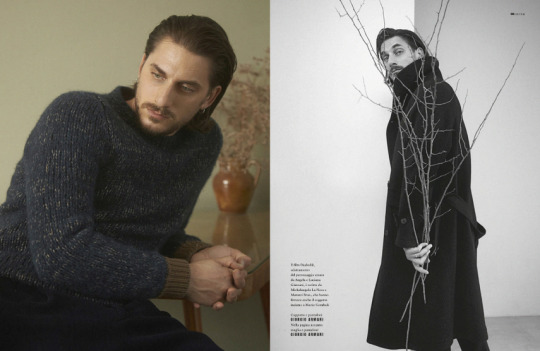
During a walk along the Kreuzberg canal in Berlin, his adopted city since 2012, the Roman actor explains that the choice to be inspired by the feline for the interpretation of the character is not accidental. «Fans will know that Diabolik takes his name from a panther. Their meeting, which lasts a few moments, is significant: after a high-tension face-to-face, the feline decides to spare the boy, almost as if he had smelled a fellow in him. The panther was one of my favorite animals as a child. I remember like it was yesterday the day my parents took me to see it at the zoo, and my amazement in front of that creature, that night-black mantle, shiny and iridescent, with bluish reflections, and that deep, rhythmic breathing. Finally, particularly indelible in my mind is the feeling of sovereign calm that emanated from the animal». “From the beginning, I had a good feeling about this film,” continues the actor. «The first meeting with the Manettis, which I have been following with interest since the time of Zora the Vampire, took place in Rome, in the neighborhood where both Antonio and Marco and I grew up. They explained to me that they had a very specific vision of the character's personality, but that they would like to see what I could offer them. We auditioned together, which was very useful in igniting the spark of collaboration. I have a clear memory of that day and the subsequent exchange of emotions and thoughts. When I later found out that I was chosen for the part, I was very happy».
Luca Marinelli is certainly not new to acting challenges. From the dazed Mattia in ‘The solitude of prime numbers’ (2010), the character with whom he conquers notoriety, over the years he engages in roles that are not very easy, very different from each other ("The only thing they have in common is my nose", ironically, pointing to his face), showing great versatility and an extraordinary capacity for psychological identification. Among his most convincing interpretations, that of the Zingaro in ‘They call me Jeeg’ and that of Martin Eden in the homonymous film by Pietro Marcello, with which he won, respectively, the Silver Ribbon and a David di Donatello as best supporting actor and the Coppa Volpi as best actor. But dealing with a myth like Diabolik, the object of an almost sacred cult, is a new challenge.
«Fifty years in the homes of Italians. 150 million copies sold. Impressive numbers. Diabolik is an icon, and for this reason it belongs to the imagination of hundreds of thousands of people. If you think you can satisfy them all, you start off on the wrong foot: you risk that the final result is not what you really want to stage, but I'm sure the public will not be disappointed, or at least I hope. You will see how much love and respect there was in implementing this transposition", explains the actor, who speaks with full knowledge of the challenge of interpreting an icon: in 2018 he plays a true sacred monster, Fabrizio De André, in ‘Principe Libero’ by Luca Facchini. A friend told him: you're crazy to take this part. But he, careless, immerses himself in the biography of the singer-songwriter, ventures like a shrink into the maze of his psyche, and he returns to the man of that icon, receiving critical acclaim for that insidious role. The only flaw, some malevolent purists observe, is his Roman accent.
Despite being a comic book hero, to face Diabolik, the actor «decided to avoid any comic characterization of the character, trying to give a convincing representation from a human, psychological point of view. Who is this mysterious man, who with his criminal findings terrorizes the rich city of Clerville? What vicissitudes lead him to become a king of crime? Questions that have become the starting point of my research. For months and months, my flat was flooded with comics, scattered all over the place. And for every hundred I read, the Manettis - who I suspect know all the 800 and more numbers in the series - were ready to lend me as many». Day after day, Marinelli has thus sneaked into the lair of the King of Terror: he spied on his objects, opened his wardrobe, rummaged in his drawers. “I fell in love with him, unconditionally, without giving in to the temptation to express a condemnation or an acquittal. It is a precious lesson, which was passed on to me in the Academy: never judge your character. You risk that a distance will form between you and him which, I play hard, is negatively reflected in the quality of the interpretation».
The result is a film that is radically different from the first film adaptation, directed by Mario Bava, in 1968. "Among its strengths, there is a fascinating 1960s aesthetic, made up of machines, costumes, places and a thousand technological inventions of our Diabolik», he says. “To my great pleasure, I was involved in the discussion of the character's look right from the start. Particularly difficult was the development of the mask and the legendary black suit, designed by Diabolik himself and equipped with fantastic characteristics, not repeatable in reality. An almost impossible mission, but after weeks of attempts, thanks to the collaboration of all departments, we arrived at a result that was very satisfied: we did it by working together. I want to emphasize the all together. When you work with the Manetti Bros., this aspect is deeply tangible: everything takes place in an atmosphere of great exchange and collaboration. Many have known each other within the crew for years, and one almost has the impression of having been adopted by a large family, rather than working on a normal set ».
“Who is this mysterious man who terrorizes the rich city of Clerville? What led him to become what he is? For months these questions have been my RESEARCH"

The film - which the Manettis defined as "darkly romantic" - will also tell, to the delight of fans, the prodromes of the love story between Diabolik and his partner in crime, Eva Kant (Miriam Leone). "Two special, different people who first sniff each other with suspicion, only to recognize each other as soul mates," he explains. “I really like their level of complicity. Diabolik, however, is a very tough and reserved character, who rarely shows a feeling: this is certainly one of the differences, perhaps the clearest, between him and me. I am his opposite: as a good romantic and empathetic, I confess, I often cry. I think that doing so can be an important moment of openness, growth and awareness, which we should learn to actively seek. Are you feeling down? Play the saddest song you know and give yourself a treat: enjoy your tears, a friend once told me. Holy words: woe to keep everything inside. You run the risk of walling yourself up alive behind a senseless wall of hardness».
Although "very interesting", the actor prefers to gloss over future film projects out of luck. "At the moment my wife and I (the German actress Alissa Jung) are very busy with our association: we are about to open the headquarters of PenPaper-Peace in Italy, the association founded by Alissa in Germany, with which we built two schools in Haiti after the disastrous earthquake of 2010». As the actor launches into the memories of his first trip to the Caribbean island, the weeping willows of the Kreuzberg canal that framed the interview mentally give way, for a moment, to the lush vegetation of the Caribbean. «Indelible memories. Two years after the disastrous earthquake, I found a country on its knees, surrounded by rubble, pain and despair, but also many smiles and a contagious desire to live", he says. As the name of our association suggests, all you need is a sheet of paper and a pen, and you can give a child education, and with it a possibility, a future. And this not only in Haiti, but all over the world. At the moment we are focusing on a project in Italy that will support the boys and girls who are going through this difficult period of the pandemic».
GQ Italia
Just wanted to translate this interview for the non-italian’s fans ^^ (sorry for my English)
170 notes
·
View notes
Text
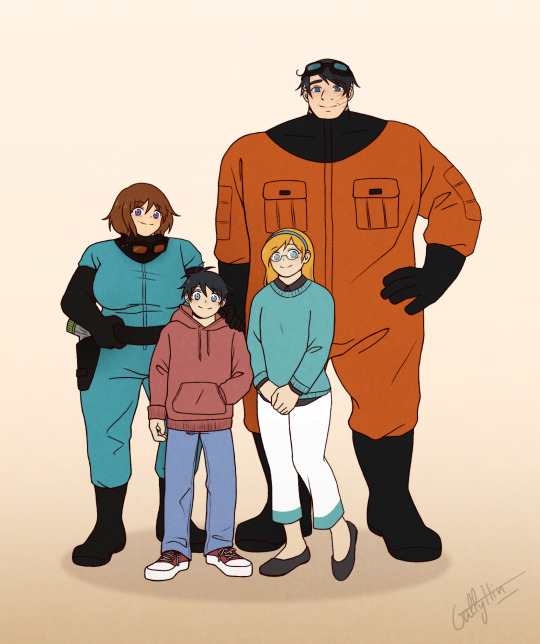
Character ref for; Jack, Maddie and Jazz,
Art by @gally-hin / @gally-hin-phantom
Okay so first off; in terms of Actual redesign, I didn't change a whole lot. I'm actually very fond of Jack and Maddie's design's, my only real issue was with their proportions. Like...look as a lady person who is also thiCC I do not have a fucking wasp thin waist and I'm sure I'm not the only one, lmao. As for Jack? Godamnit he looked like a brick on toothpicks. Just Let him be a fucking Bara man! Anyway of course I asked Gally to do this one bc they're fucking great at drawing different body types
I also cannot and will not take credit for Jazz's outfit. I didn't have any issue with her canon clothes aside from them being a bit plain, so what she's wearing here was literally pulled straight off of her original concept art, which I will link here.
Anyway, getting to the Actual character lore now, let's start with
Maddie Fenton
-Full name is Madeline (I haven't decided on a maiden name yet)
-Born and raised on a farm in Arkansas, had a southern accent that she trained herself out of in college bc it was just one more reason for people not to take her seriously. Still sometimes uses "y'all" completely unironically bc old habits die hard.
-She has a really big family, and they're proud of her accomplishments but feel like she's wasting her talent studying ghosts, because really, up until the Fenton portal was up and running there wasn't even any solid proof they existed. Her sister Alicia is the one outlier there, and even if she doesn't understand, it she completely supports her.
-She majored in engineering and minored in psychology at Wisconsin EDU. Her, Jack and Vlad were all in the same engineering class, and that's where they met.
-Maddie is particularly interested in how ghosts think, analysing their behavior, their motives. Not only that, but they aren't just dead people with unfinished business, they've built an entire culture in the Ghost Zone that is completely seperate from humanity, and she wants to understand all of it.
-skilled marksman and 9th degree black belt, (which is. The highest fucking level there is holy shit? I looked it up after I saw it on her wiki page.)
Jack Fenton
-He's from Minnesota (Amity park is in Illinois and him and Maddie didn't move there until after they got married)
-okay, "but why minnesota specifically" you ask? Because. I crave. Foot ball discourse.
-minnesota vikings vs green bay packers guys do you UNDERSTAND WHERE IM GOING WITH THIS
-The funny thing is that Jack only watches football casually while Vlad is a fucking die hard so when these two got together to see a game it was like....
-Jack: Here to chill and have a good time.
-Vlad: Primed and ready to start a fist fight at any given moment.
-I am never not going to be salty about how Canon Jack was portrayed like a complete moron 99% percent of the time. Like no...theres a difference between Actual Stupid and ADHD induced dumbass-ery.
-Am I saying Jack Fenton has ADHD? Yes. why? Because I also have ADHD and I have always vibed So Hard with his Character.
-Jack is loud and easily excited about things that interest him. He's impulsive and fidgety and yeah, a bit absent minded. He has a mouth that clearly runs so much faster than his head. His train of thought doesn't get derailed so much as it stops and takes several different detours on the way to it's final destination.
-and that's only the tip of the iceberg, really, I'd need an entire essay to get into this completely, but I just really relate.
-Jacks skill-set / interests regarding ghosts vary a bit from Maddie's, most notably in the sense that he doesn't believe that they're static entities already set in their ways, completely incapable of change.
-Jack majored in engineering and minored in Biology at Wisconsin EDU.
-Jack's work with tech is a bit hit or miss. He definitely HAS the engineering skills, but the intrest isn't always there and he's constantly jumping back and forth between different projects. He tends to focus on the concept work and schematics and leave most of the assembly to Maddie as a result. It's an arrangement that works well for them, and has drastically decreased the number of unintentional explosions in the lab.
-A lot of Jack's work tends to revolve around ghostly biology and Ectoplasm, figuring out how ghosts are made, what makes them tick, what the hell Ectoplasm Actually Is, how it's used as an energy source, ect.
-and yes, that does also mean he handles the dissections.
-See that facial scar? Yeah, that's not actually there at the start of the series rewrite but it's very important for plot reasons so I had to include it. Can't say much more on the subject because SPOILERs owo.
Jasmine Fenton
-Jazz is a 18 years old, and a senior at Casper high.
-Which means she prepping to go away to college and won't be around to keep an eye on Danny.
-Obviously that doesn't mean I'm just writing her out of the story, oh no. Know why? Because she's also gonna go to Wisconsin EDU. ya know who else is in Wisconsin? Fuckin' Vlad.
-Jazz is autistic, Although she passes for neurotypical in part due to symptoms being completely over looked in girls due to gender stereotyping and also the fact that she doesn't have any special interests that are considered " "too weird.""
- Her hyperfixation with psychology started at a young age in an effort to better understand people, and social/emotional cues and all that.
-Jazz is well liked at school but she's not popular or apart of any specific group or clique. She's very kind and compassionate to people, and just about everyone knows her, but you'd be hard pressed to find someone who actually Considered her a friend. Except maybe Spike.
-I'm gonna have to give spike his own Character ref at some point, but he's this scary looking goth kid that's been held back twice. He's actually super sweet, just really fuckin' quiet and anxious. Him and jazz kinda ended up gravitating towards each other. She might do most of the talking, but they look out for each other.
-its not like jazz doesn't try to socialize, but it's difficult and she's found it much easier and less stressful to just. Keep to herself and let her interactions with her peers stay shallow and superficial. Sure, it's lonely sometimes but it's better than constantly worrying about saying the wrong thing or making some other misstep.
-One of Jazz's other special interests is football, and it's not so much the players or the game as it is the strategy of it? Started out as one of those things you do to bond with your dad, and she ended up getting really into it.
-She absolutley winds up getting into stupidly intense discussions with Vlad about it, too, lmao.
-Her and Danny probably bonded over SBNation bc that shit has both sentient satellites and ridiculously complex football mechanics.
-She's completely oblivious to the fact, but Dash has a massive crush on her bc holy shit this girl understands football (hey bud your toxic masculinity is showing put that shit away)
-I mentioned that Danny was in Cheer for a bit in middle school so it makes sense that she'd also be pushed into doing some kind of extracurricular activity.....so.....she was in a martial arts class for a bit thanks to Maddie and has a good grasp on self defense.
I think that's everything? I feel like I'm leaving things out tho? Idk if I did I'll come back and add on to this later and also pls don't hesitate to ask questions bc it really helps me flesh things out better.
96 notes
·
View notes
Note
Hello, another question. When discussing Lily you often point out how her friends ended up being her husband’s rather than her own — as an argument proving her social isolation in her last years. How is that? Maybe she had friends but they were killed/neutralized like the McKinnon’s, the MacDonald’s, the Longbottom’s... I recall they get a visit from an old woman in Godric’s Hollow as well. Is there something I missed?
Certainly, I do believe that Lily had correspondents within the Order. However, there is a stark difference between people you’re on friendly terms with and people who are your friends. We see that difference most clearly when we compare Harry’s relationship to Ron and Hermione versus Dean or Seamus, for instance. Additionally, we could compare the closeness of James and Sirius to the friendship shared between Lily and Severus when they were younger, prior to the events of “Snape’s Worst Memory.” This brings me to my primary point, which is that through much of the Harry Potter series Lily is conspicuous for her near absence. Where Sirius, Remus, and even Peter might recollect their memories of James while in the presence of Harry, the first real concrete bit of information we get about Lily (other than Petunia’s accusation that she had been the “favored, perfect child” of their parents) comes from Slughorn --her former teacher-- when he mentioned she had a talent for Potions that he believed Harry shared (i.e. this is also the first occasion where Harry is compared favorably to his mother in the same way he is repeatedly compared to James). Prior to that, Harry mostly just “had his mother’s eyes” and a haunting memory of his mother’s final moments of life --courtesy of the trauma-induced flashback the Dementors provoke-- to go by.
Importantly, where Harry is able to form connections with the memory of his father through James’s friends, Lily is far less real and far more akin to a symbolic figure of maternal sacrifice (i.e. Virgin Mary) or even something of a spectral/spiritual presence in his life. We learn very little about Lily as a person and it would appear there are no people she left behind who are willing to reminiscence fondly about Lily in the way the remaining Marauders do for James. It is not until the very final book that we get an idea of who Lily may have been beyond the maternal symbology or the spectral pair of eyes she left behind with her son. While this was deliberate on Rowling’s part in order to justify her twist that she and Severus once had a close friendship, this also has the unfortunate effect of leaving the reader with a very limited impression of what Lily’s social life may have been like after Hogwarts. Because Rowling only tells the reader that Lily was popular at Hogwarts and she fails to show Lily having any lasting or meaningful relationship with friends outside of James’s immediate social circle upon leaving Hogwarts, canon does not strongly support an interpretation of Lily as someone whose life was particularly filled with close friendships or meaningful relationships outside of her marriage to James Potter.
Indeed, the very fact that she seems to have turned to the company of Bathilda Bagshot while in Godric’s Hollow may further speak to her want for adult company. Her letter to Sirius paints an interesting picture, particularly her revelation that James had become a bit restless because Dumbledore had borrowed his Invisibility Cloak and that prevented him from leaving the house. The implication is that when he had the Invisibility Cloak, James may have taken to venturing outside Godric’s Hollow and leaving Lily behind to care for Harry. This is a privilege that Rowling does not seem to extend to Lily, either. Notably, she does not complain to Sirius that she misses the advantages of James’s Invisibility Cloak for herself, she only ruefully acknowledges that James in unhappy being cooped up in the house with her and Harry. The implication is that she spends much of her time confined to Godric’s Hollow raising Harry. Outside of James, who is suggestively more able to leave, it would seem she’s taken to finding what company she can from residents like Bathilda Bagshot who, while canonically a respected historian, is also framed as having become an increasingly eccentric woman who was also many years Lily’s senior and difficult to really frame as a potentially close peer.
Beyond that, we are told through supplemental information from Pottermore (or whatever it has changed its name to most recently) that James’ behavior at a dinner with Petunia was the final catalyst in Lily no longer being on speaking terms with her sister. Thus, that is one familial relationship that Lily has lost since Hogwarts. Furthermore, while it is certainly possible that she still had her parents at that point, as Rowling seems to have an issue with writing grandparents, we can only make inferences that Lily might have still had the support of her parents and to what extent that support may have gone given they were Muggle and the status quo for Rowling’s world seems to be the complete assimilation of Muggle-borns into wizarding society. Ultimately, outside of Bathilda Bagshot, Lily appears to be cut off from the world except through her written correspondence. One could argue that the necessity of her going into hiding was the real reason for her apparent isolation, yet we still have certain key issues. The very fact that Lily draws attention to James resenting the loss of his Invisibility Cloak draws the reader’s attention to the contrast between his apparent situation during that point in the war and her own (i.e. James has some expectation to be able to come and go from Godric’s Hollow and he has the privilege to be able to do so).
Finally, the very fact that the first occasion where Harry is presented with an opportunity to read a letter written by his mother and get a better idea of her as a person is because she was writing to Sirius further supports a reading of Lily as not only being more isolated than James but also dependent on his social circle for adult interactions. Notably, she is not writing to Sirius on behalf of James, she is corresponding with him as she would a friend. While we can speculate on all the many possible other people she may have written to in a similar fashion, the fact remains that canon only supplies us with one concrete example of Lily interacting with anyone as she would a friend and that just so happens to be someone important to James. Thus, it is mostly because canon fails to supply us with any strong evidence of Lily having meaningful connections outside of James and his friends that I tend to interpret her later years as being more isolated to James and his immediate circle.
Certainly, there is room for theories and headcanons about all the many friendships Lily may have had during that period in her life (I love speculative fanfiction that has her exchanging letters with Alice Longbottom, for example) but as far as the books, Rowling tells us very little and what she shows us does hint to a woman who has very limited connection to anyone; is reaching out to her elderly neighbors for companionship while her husband may be spending his time away from the house when he can and who becomes restless when he can’t; has already had her bridges burned due to the antics of her husband with a portion of her family; has already cut ties with her oldest friend from childhood and does not appear to have made any lasting friendships of note --other than the one she had formed with Severus-- that she cared to maintain after leaving Hogwarts; and who is only shown corresponding with one of her husband’s friends as a means to socialize with someone roughly her own age. For all of those reasons, I do tend to interpret Lily as someone whose post-Hogwarts life was more restricted than she may have wanted. As I said, it is possible to read her differently and there are plenty of headcanons that circulate about what her life may have been like during those years but when looking at what scant offerings canon provides us I personally struggle to read Lily’s life during that period as anything other than a little more complicated and maybe a little less romantic seeming than some in fandom might prefer to think. I hope that answers your question and thanks for your ask!
Regards,
Raptured Night
123 notes
·
View notes
Photo
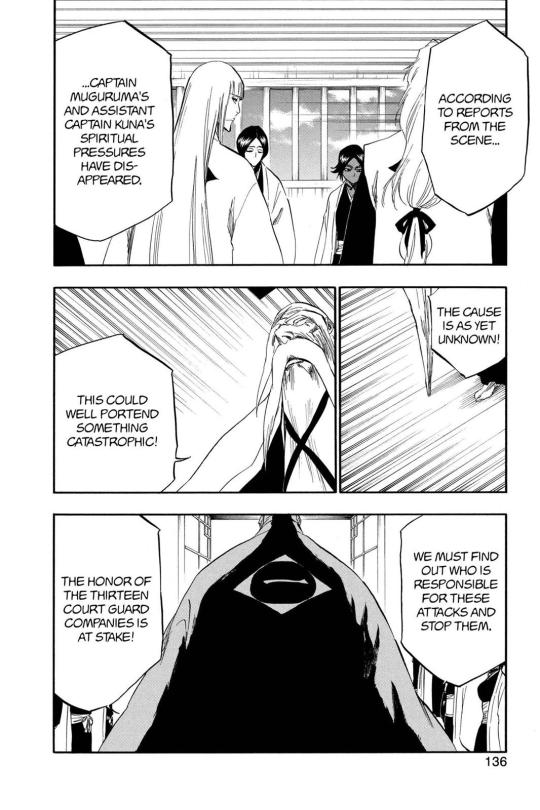
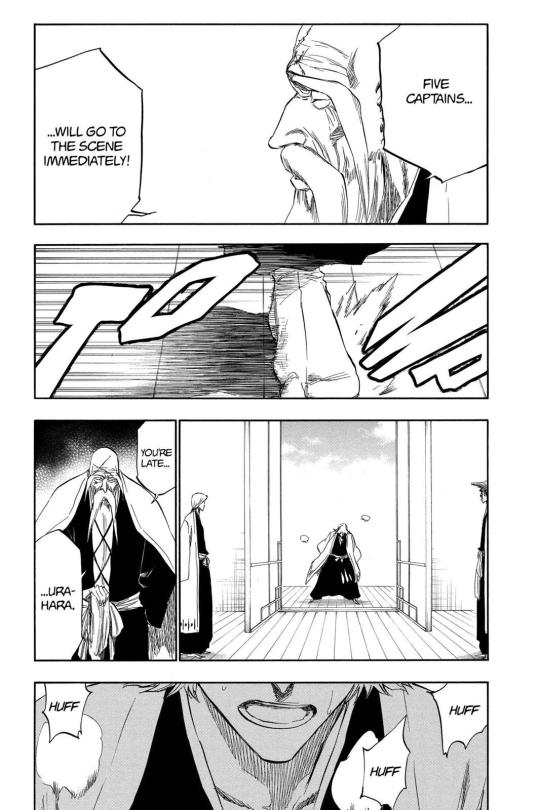

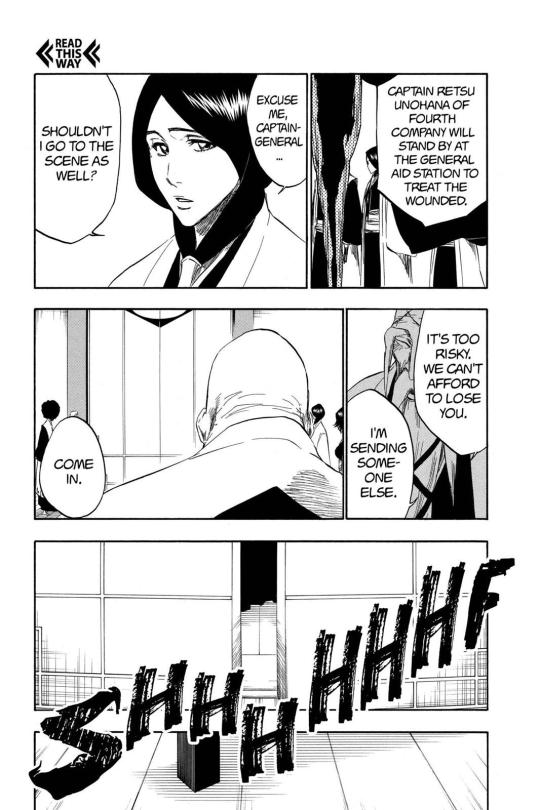

Critical Analysis & Tactics I (CAT-1): The Hollowfication Incident
How strong is Yoruichi? That’s actually a very involved question. I’ve decided to create a series of articles detailing my thoughts on the matter by looking at military incidents and confrontations involving her. This is the first, and you may consult the others at your leisure:
CAT-2: The Central 46 Trial Breakout
CAT-3: Yoruichi vs. Byakuya
CAT-4A & B: Yoruichi vs. Soifon
CAT-5: Yoruichi & Soifon vs. Aizen
CAT-6: Yoruichi vs. Yammy
CAT-7: Yoruichi, Kisuke, & Isshin vs. Aizen
CAT-8: Yoruichi & Co. vs. Yhwach
CAT-9: Yoruichi vs. Askin
I’ve talked about this topic before (here) but I’d like to investigate it again from a different angle while also discussing what really happened on the night of the Hollowfication Incident. I think the five pages above tell you something very important about her strength, particularly the bottom-left one. These are from chapter -103 and are Yamamoto’s orders after Kensei, Mashiro, and the upper officer corps of the 9th Division (the Muguruma Commando Unit) go “missing”. (I’ve omitted Kisuke’s interruption as it doesn’t reveal much that’s pertinent to this discussion.) We learn an awful lot from these orders and it’s worth going through it all in some detail in order to get to my point.
Since the is is a long post, let me put the conclusion here up front: Yoruichi is much stronger than the average Taichō of the Gotei 13.
01. I would, quite aside from these pages, first like to remind the reader that nominally the Gotei 13, Onmitsukidō, and the Kidō Corps are equal in their status of reporting to Central 46. The Onmitsukidō and the Kidō Corps do not report to the Gotei 13. This means that accordingly, the Captain-Commander (Yamamoto), the Supreme Commander (Yoruichi), and the Corps Commander (Tessai) are technically co-equal in official stature; you might regard them as roughly equivalently ranked, being like the Joint Chiefs of Staff of their respective branches. (Jūshirō’s shock and Shunsui’s comment that Tessai’s presence indicates, “This is turning into a big deal,” is proof of that.)
Yamamoto, by virtue of seniority over the other two (and Yoruichi’s dual-hatted command within the Gotei 13) still commands their respect (as evidenced by Tessai addressing him formally and Yoruichi heeding his orders without question) and might be thought of as being like a Chairman of the Joint Chiefs of Staff as a result. I’m not arguing at all that Yoruichi and Tessai are equal in strength to Yamamoto, as they plainly are not. However, you would expect by virtue of these positions that they would be more powerful than run of the mill Taichō, and I believe this sequence of events proves that.
02. Notice in the second page that Yamamoto says that 5 Taichō will be dispatched to deal with the situation. This does seem to be an accurate translation by Viz as the red characters, 隊長 (taichō) and 五 (go), do indeed mean “Captain” and “five”.
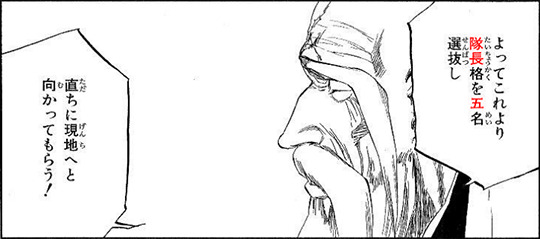
He will then proceed to name (on page 3) Rose, Shinji, and Love, and then to indicate Tessai and Hachigen (on page 5). Thus: even though he is the Lieutenant of the Kidō Corps, Hachigen’s equivalent rank in the Gotei 13 would be Captain! He is a Taichō-level combatant, which fits in well with his performance alongside Soifon against Barragan. That he is actually lower ranked than Tessai despite this tells you that Tessai is likely notably stronger (which is subsequently borne out). Shunsui is the one to suggest that Tessai be substituted with Lisa, to which Yamamoto agrees.
03. Agreeing to this fits into Yamamoto’s other behavior. Let’s talk about him first. The important thing to understand about Yamamoto is that we perceive him very differently as a character (because of our point of view) than how the characters themselves perceive him in-universe. To your average reader, he probably seems staid, close-minded, overly conservative, dispassionate, and stubborn, precisely because he supports (and substantially built!) the status quo. However, he is supposed to be the most experienced, wise, and powerful Shinigami there is. And, in fact, he is.
Consider things from Yamamoto’s perspective. Things in the Gotei 13, the Seireitei, and Soul Society as a whole have worked for over 2,011 years as of TBTP. (The graduating class of about 1956, which Renji, Momo, Kira, and originally Rukia were part of, is definitively established as the Academy’s 2066th graduating year, meaning the Academy was founded circa 110 BC.) That compares quite favorably to the longest continuously extant human state, the Pandyan Empire, which lasted for about 1,850 years. The runner up is the Eastern Roman (or Byzantine) Empire which lasted 1,123 years by itself (add 499 more if you want to count the whole Roman Empire too, as the Byzantines themselves would’ve). That’s pretty good. It tells you something: Yamamoto’s system works (largely because he guarantees its continuation through his own personal power).
And Yamamoto generally conducts himself rather cautiously and methodically. He doesn’t like change, spontaneity, or impulsivity, regardless of how justifiable it may or may not be. (These are all things Ichigo initially represents.) And actually, as a soldier, that is probably exactly the kind of commanding officer you would really want to serve under: one who doesn’t take wild risks which might get your ass killed. People respect Yamamoto not just for his strength, but because he’s actually good at what he does.
04. Before we talk about what his orders actually are, I want to make a brief digression here to make a point: only Taichō-level combatants actually matter in the Gotei 13 in terms of military calculations. This is firmly established by the Soul Society arc. Byakuya says this in chapter 162 about bankai:
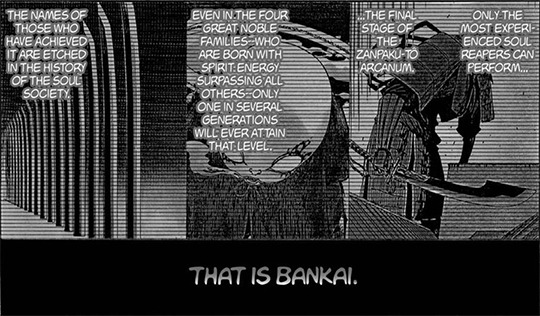
The key takeaways:
Members of the Great Noble Clans are stronger than everyone else (making people like Yamamoto, Retsu, Aizen, and Kenpachi extreme anomalies)
Even members of the Great Noble Clans only rarely achieve bankai (which, given a Shinigami generation is much longer than a human one, is saying something)
People who achieve bankai are uniformly important to Soul Society
You know who has bankai? Renji, a Fukutaichō who just achieved it and had used it in open combat against Byakuya, a feat which everyone with spiritual sense should’ve detected at the time given it, as Yoruichi notes elsewhere, makes one 5 to 10 times stronger. (Recall how on the Senzaikyu Bridge, everyone felt Ichigo’s approach even though he didn’t have bankai yet.) So Renji’s feat should be very impressive and important, right? Not to Yamamoto. In chapter 153, he already told us:
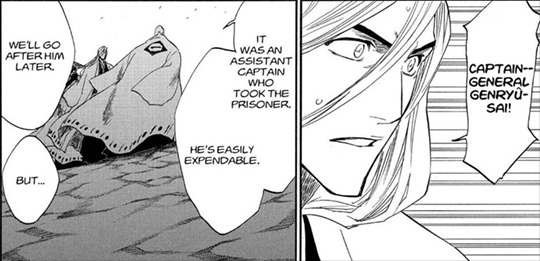
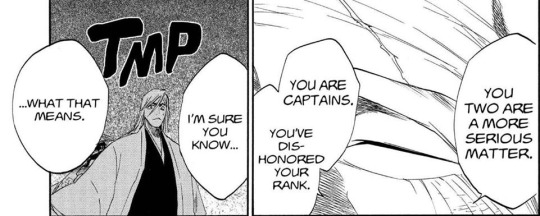
Renji is expendable. He could be killed and replaced without issue. Yamamoto then goes on to even further establish that Fukutaichō are comparatively useless by effortlessly crushing Nanao with his reiatsu alone in chapter 155. In short, Yamamoto does not rate bankai by itself. (The sole exception to this attitude by Yamamoto is perhaps toward his own Fukutaichō, Sasakibe.) It should also be extremely self-evident that Taichō-level combatants can have an extremely wide separation in power from one another, and I’m not going to substantiate that assertion here because we’d be here all day. So, when we talk about what happens during the Hollowfication Incident, let’s do so with a sense of clarity that only Taichō really matter in Yamamoto’s calculations.
05. Having established that, let’s return to the pages and talk about Yamamoto’s orders and how he’s positioning his forces on this particular night. A summary:
1st: Yamamoto - defense
2nd: Yoruichi - standby
3rd: Rose - deployed
4th: Retsu - defense
5th: Shinji - deployed
6th: Ginrei - defense
7th: Love - deployed
8th: Shunsui - defense
9th: Kensei - MIA
10th: n/a - office unfilled
11th: Kiganjō - no orders
12th: Kisuke - no orders
13th: Jūshirō - defense
The Gotei 13 had 12 Taichō at the time, as the 10th Division’s had died and not been replaced yet. Kensei was at this point MIA, thus putting them at 11. Including Tessai and Hachigen (as noted earlier) bumps them back up to 13. This tells us why the Kidō Corps was brought in: to bring the Gotei 13 back up to full strength during this crisis.
Yamamoto directly assigns his oldest and most experienced subordinates (Shunsui, Jūshirō, and Ginrei) to the defense of the Seireitei. His orders to Retsu to stay and his own continuing presence mean that indeed all the oldest and seemingly strongest Taichō are allocated to defense and garrison duty.
Rose, Shinji, and Love are deployed (along with, initially, Tessai and Hachigen) to investigate.
Kiganjō and Kisuke aren’t issued orders, presumably because both are considered unreliable. Kisuke is there, if late, but is effectively dismissed after his outburst regarding Hiyori.
Yoruichi is designated as the only flexible element in this plan. Before I return to this final point, I want to address some lingering matters and then explain to you what this deployment actually means.
First, It’s notable that Yamamoto’s assertion that Retsu is “too important” is a reflection of her healing abilities and their importance to a potential wartime situation. (Note that Kisuke, in chapter 227, dismissed Orihime from the war effort against Aizen by saying that 4th Division, particularly Retsu, more than equaled her abilities.)
Second, the substitution of Lisa for Tessai (at Shunsui’s suggestion) is not a reflection on Lisa’s power (remember: Fukutaichō don’t matter, and Lisa didn’t have bankai at this time anyway). It’s suggested because of the risk of sending Tessai and Hachigen together. It’s presumably approved because of the seeming overabundance of force in the deployed unit.
What do I mean by that? Think about it this way: a Taichō and his subordinates go missing. While that is (very) concerning, consider the ways in which it is likely to happen. Is it likely to be a Hollow? Almost certainly not. It suggests an ambush. Which in turn suggests a coordinated military strategy. By whom? Unknown. So, how do you respond? You respond in force, but there is probably such a thing as too much force. After all, what is likely to take out 4 Taichō, let alone 5? Not a lot. So the difference between 4 and 5 doesn’t much matter, and substituting Lisa for Tessai is fine. The deployed force should still be overkill either way.
It also retains Tessai for defense, and Yamamoto’s real concern here is revealed by his allocation of a preponderance of forces to the Seireitei: he seems to believe this is a diversion in preparation for an attack on the Seireitei itself. Thus, through action and inaction alike, he commits 4 Taichō to deployment and retains 9 for defense. He is overwhelmingly interested in defense against possible follow-ups and believes he has likely still committed excessive force to deal with whatever Kensei’s situation is.
06. Thus, finally, we come to Yoruichi’s role in this plan as the the only mobile auxiliary force. Let me state my premise first, then I’ll substantiate it: Yoruichi is the only possible backup the deployed force has, meaning she and she alone is their lifeline in the event something goes wrong—this fact alone tells you she is more powerful than the deployed force as a whole. In other words, Yoruichi is stronger than Kensei, Rose, Love, Shinji, Tessai, and Hachigen put together.
Bold claim, I’m sure! What evidence do I have to support this assertion? I tell you it’s simply obvious using conservative tactical logic, studying their military disposition, and understanding the political situation.
Tactical logic first: suppose for a second that there was an unknown criminal incident in a local big box store like Walmart, Home Depot, or whatever you like. A squad car’s worth of cops (2) went in. They then stopped responding to central. So, backup is ordered and now four times as many cops go in (8). What if they stop responding? Would you send in another 2 cops? Or 8? Or even 10? No. You would likely send in at least 20–30, if not just the local SWAT team. It doesn’t make sense, after having lost so many elements already, not to escalate radically, just as sending 8 guys is a radical escalation from sending 2. You don’t send 2, then 8, then somewhere between 2 and 10 yet again. You’re throwing away limited forces for no gain at that point.
Yoruichi is the SWAT team. The fact Yoruichi alone was the potential reinforcements for the deployed group tells you that one of two things is true:
Yoruichi is stronger, unto herself, than the deployed group, or...
Yamamoto was prepared to simply sacrifice the deployed group if the situation went bad, and their backup, for no gain
Military disposition second: given Yamamoto is already working with a diminished and very finite force, with possibly 2 out of 13 Taichō down, (2) does not make a lot of sense given his character. (Again: note how he reserved Retsu and Tessai out of strategic concern.) What is the benefit? It is worth noting here that after the defection of Aizen, Gin, and Kaname a century later, the Seireitei also adopted a conservative and defensive posture (but more on this later).
Political situation third: doing this also wouldn’t make a lot of sense given the state that the Gotei 13 was in as a whole at the time, which Shunsui and Jūshirō helpfully expounded upon in chapter -108:

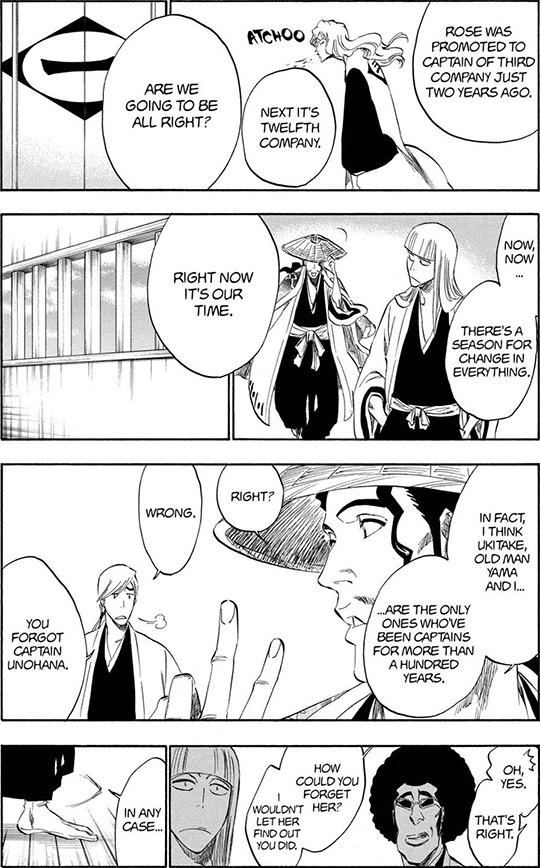
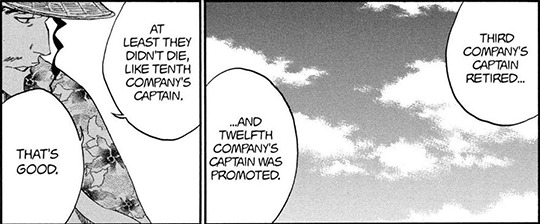
Long story made short, the Gotei 13 was in a period of upheaval and turmoil at the time—a period of weakness. Sacrificing your military assets when you are weak is not particularly intelligent.
We can thus recast our two earlier possibilities as follows:
Yoruichi is in fact incredibly strong, or...
Yamamoto is a military idiot who wasted forces for no good reason, despite the fact he is supposed to be extremely militarily competent
I know which of those two my money is on. But I’m also not done yet in proving it.
07. Let’s be very clear here that the events of the Hollowfication Incident were the most extreme losses we know of that the Gotei 13 ever suffered in terms of assets that actually mattered. The Gotei 13 lost a grand total of 8 Taichō-class combatants that night (Yoruichi, Kisuke, Tessai, Hachigen, Shinji, Rose, Love, and Kensei). Their strength was reduced from 14 acting with the Kidō Corps to 6. That’s 57.12% losses. From this perspective, it was a much worse disaster than Aizen’s defection or the Wandenreich War in terms of outcome. The loss of both the Supreme Commander of the Onmitsukidō and the Corps Commander of the Kidō Corps was especially grievous.
It’s also worth pointing out that as far as Central 46 was concerned the Hollowfication Incident was a conspiracy orchestrated by Kisuke, Tessai, and by proxy Yoruichi. Given the losses, it can only be read as an attempted coup, and other than Aizen’s murder of Central 46, was a much more serious event than even Aizen’s defection.
This raises a simple question: Why didn’t Central 46 demand Yoruichi, Tessai, and Kisuke be hunted down?
The first and most obvious answer is that numerically the forces to do so while maintaining the defense of the Seireitei simply did not exist. Only Yamamoto, Retsu, Ginrei, Shunsui, Kiganjō, and Jūshirō were left. Kiganjō was plainly unsuited for such a mission. Retsu would be even more critical after such losses and would never be sent. Ginrei, Shunsui, and Jūshirō were exactly the ones tasked with securing the Seireitei and could be thought of as the ‘minimum’ needed to do that. And finally, it’s unlikely that Yamamoto himself would go, even though he later states to both Shunsui and Jūshirō in chapter 154 that:

Put simply: Yamamoto didn’t have the manpower to chase them. (And Yamamoto would make a very similar decision after Aizen’s defection, choosing not to pursue him, Gin, and Kaname to Hueco Mundo, which he likely regarded as being a giant trap he could ill afford to take loses from; he learned from the Hollowfication Incident!)
But that isn’t the only answer, because even when he later did after the Gotei 13 was reconstituted, he wasn’t interested in tracking them down. This is surely not because they were just written off as dead (as Byakuya implies on the Senzaikyu Bridge) given the enormity of the accusations against them. The Gotei 13 didn’t give up on tracking down Ginjō and Xcution for far less; it isn’t in the business of forgiving or forgetting.
Maybe Yoruichi choosing to spare Central 46′s lives factored into that decision (see here) but if it did, doesn’t, “She might come back and kill us all and there’s nothing we could do to stop it,” tell you she’s very strong?
And if that didn’t affect the decision-making process, what did? I’ll tell you plainly: Yamamoto did not have confidence that any team he could afford to send out was likely to beat Yoruichi, Tessai, and Kisuke—and he didn’t think much of Kisuke. That should also tell you that Yoruichi is very strong.
The Urahara Shōten crew was allowed not only to escape but to live in peace not just because of whatever actions that might have taken to protect themselves, but because a military confrontation with them was simply too risky. And a major component of that risk must, logically, be that Yoruichi is extremely strong.
The anime-only Reigai Uprising filler arc is exactly that—filler—but it is known that Kubo was at least consulted for the filler arcs. And during that filler arc, in episode 319, Yoruichi’s Wiki entry notes the following:
She fought three Shinigami captains and four lieutenant-level and above opponents at the same time with Hakuda without receiving any notable damage.
All of the above is in my opinion convincing evidence that although this feat is non-canon, it would be very plausible for it to happen in canon. That’s how strong Yoruichi is. That is why she is the designated threat barometer (see here) for the latter half of the series. Yoruichi is not arrogant. This whole sequence is designed to tell you as much.
P.S. Since I'm also vaguely talking about this: yeah, Yoruichi didn't beat Askin. But you know what? Mayuri didn't beat Pernida, Shunsui didn't beat Lille, and Byakuya, Tōshirō, Kenpachi, and the rest didn't beat Gerard. None of the Sternritter were beaten by their primary opponents. And, for the record, Yoruichi did better against Askin than Ōetsu did, without a ridiculously overpowered zanpakutō and with a much stronger Askin, as Yhwach hadn't yet absorbed the Soul King and powered up the Sternritter when Ōetsu confronted them. Just sayin'...
32 notes
·
View notes
Text
To continue supporting content makers, this tag game is meant to show the entire process of making creative content: this can be for any creation.
RULES - When your work is tagged, show the process of its creation from planning to posting, then tag up to 5 people with a specific link to one of their creative works you’d like to see the process of. Use the tag #showyourprocess so we can find yours.
I've been tagged by @lordbelacqua (thank you Dea! <3) to talk about Backlead aka: that one Masriel fic I wrote where I got massively carried away...
Rambling/essay under the cut - fair warning, it's a long one!
Okay so first of all just a little disclaimer that Backlead did not follow my usual writing process - the idea was 110% borne out of self-indulgence and it was also both my first foray into HDM fanfic and my return to fanfic as a whole after a long hiatus from writing, so for me this was really a chance to just get back into the swing of things. Everything from Heavenly Guard through to Swansong and all of my current WIPs follow a more structured process and I'm happy to discuss any of them in a separate post!
PLANNING: I tend to find with my fics that I either have a nice little timeline of events planned out pre-writing or I have a very specific event in my head and I just take that and see how things unravel from there and Backlead was 100% the latter.
All I had in my head initially was the ballroom dance scene and so a lot of my admittedly-minimal planning was around the technicalities of that particular section, as well as some of the more general details e.g Marisa's outfit, the setting of the ball, etc. Planning the dance was the most fun part because it was a chance for me to put a lot of my dance knowledge to good use and think up something that fits the back-and-forth way in which Marisa and Asriel frequently navigate their encounters. In a way though I'm actually very glad that a lot of this fic Just Happened instead of being planned out, sometimes it's nice to just run away with an idea!
MUSIC: This gets its own section because this is one of the most important things in my process. Every single fic I write is written to various pieces of music that just help me to put myself in the right headspace for whatever I'm writing at the time - sometimes its just a single piece of music (I wrote Swansong in one hour with just one track from the Unforgotten - a TV show in the UK for those of you not familiar with it - soundtrack on repeat) and sometimes its entire playlists. I do love geeking out about my music choices for fic writing so happy to talk more in a separate post about music for some of my other fics if anyone's curious!
For Backlead I found a couple of playlist-vids from the lovely raviolae on youtube that really worked wonders for my writing. This comes with a disclaimer that I did not necessarily attribute any of these specific songs to either dance scene and I wanted to leave that open for people's imagination - but it's still brilliant vibes for thinking about two once-lovers-now-enemies trying to one-up each other whilst ignoring how much they still find each other attractive.
The two playlist-vids in question are here: you're stuck on the dance floor with your rival and find out they're an annoyingly good dancer and you're dancing with your rival and both of you want to lead
WRITING: First step every time is to figure out who's POV I'm going to cover because that makes a major difference in the way I'm going to write. Characterisation is the big thing for me and there's nothing I love more than to really get inside a character's head and basically think like them, and figure out what makes them tick and how they'll react to the story I'm putting them in. With my initial idea for Backlead being basically about the subtle power dynamics of a ballroom dance, Marisa felt like the natural go-to for this one and I found it much easier in this instance to write in her headspace than in Asriel's.
I wrote this fic in a very out-of-order fashion. The first dance (the slower, waltz-style dance) was the first part I finished, then I did as hinted at above get very carried away and move onto the section in the hallway, then I went right to the start and covered the entire section leading up to that first dance. Then I revisited the hallway scene because I wanted to rework it (the initial version was planned to be more explicit and involved less dialogue - but I wasn't comfortable with writing out the former at that time and the latter got changed by way of me having a sudden burst of dialogue-themed inspiration). The second, more set piece style dance came last in terms of the 'major events' that I wrote purely because I spent a lot of time racking with my dance knowledge to try and make it work in a way that didn't feel forced.
My final major writing stage is to write the 'transitions' between each major part - small pieces where nothing particularly noteworthy happens but it helps the fic to flow from one conversation/event to the next and also sometimes allows me to sneak in a bit of characterisation that I couldn't fit in elsewhere.
Along the way I often leave sentences half-finished with a bracket indicator so I know to go back to it later or I make little notes if I've added something in that needs explaining earlier in the fic, and I make sure to sort those parts out before I jump to the self review/beta reader stage. A couple of examples are below:
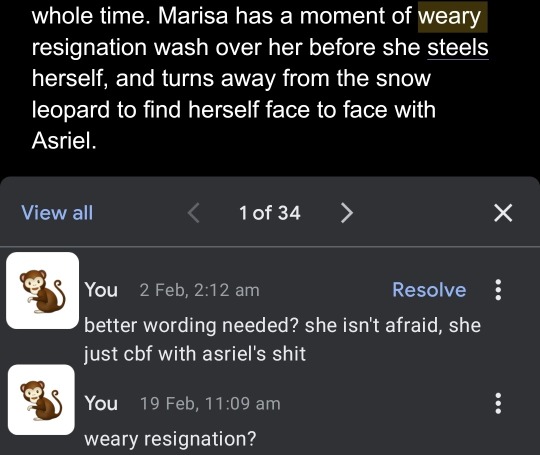
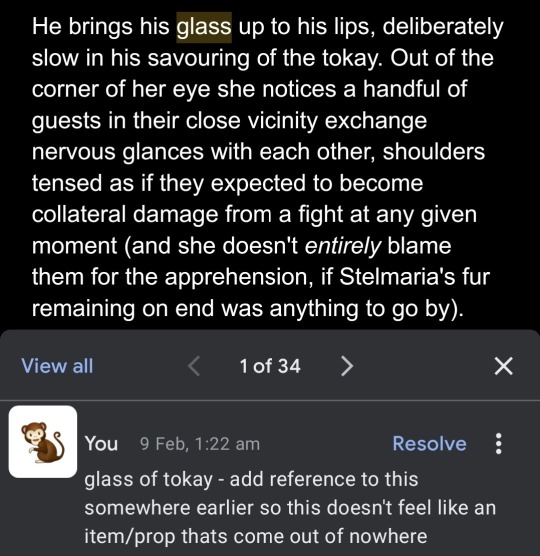
Although sometimes this method does also annoy future me too 😂:

SELF REVIEW/BETA REVIEW: Whenever I finish a fic, it gets put away for a day or two and I stop thinking about it completely - if I'm using a beta reader (usually @thatlavanderbard but I sometimes enlist help from friends on discord), I'll send them a copy of my draft at this point so they can start going through and leaving comments for me to work on, but the idea is that when I go back to my work a few days later I'm looking at it with semi-fresh eyes and can properly sift through each sentence to make sure things make sense.
When I'm self-reviewing I generally tend to follow this order of operations: spelling/grammar check (via docs') -> flow check (making sure any deliberate time skips/POV changes/etc in my fic flow smoothly from one part to the next) -> address beta reader comments (because they almost always pick up on things I myself would've picked up on anyway) -> general detailed final read through to make sure I'm happy with every single line and it all makes sense.
Backlead didn't get a full beta read because I had hit a point with it where I just wanted it up ASAP and my impatience got the better of me, but the rest of the above self-review stages still happened and I still spent a fair few evenings going through it properly and also running the occasional sentence or two by some helpful discord friends if I didn't like the way it flowed but couldn't quite figure out how to remedy it!
POSTING: First step was to reset my AO3 password because I forgot it yet again whoops
On a more serious note this part is pretty straightforward - once I'm ready to post a new fic I generally just go on autopilot for this part of the process (other than when I get to 'additional tags' and immediately get brain freeze...). As soon as it's up on AO3 I swing by here to make a post about it, then swing by discord to drop the link to friends who may be interested in reading it and then I normally nervously scuttle away from my notifications for a while out of fear that people hate it lmao.
That last part was especially true for Backlead because of it being my first trip into HDM fanfic and I always get extra nervous when posting my first fanfic for a new show/game/etc. Thankfully I got quite a few nice comments both on here and on discord that provided good motivation to stick around and post a few more things!
I always panic when asked to tag people lmao but I'll tag @fortheloveofwii for any part of the Onward, Onward series, @lyracordelia for any chapter in Hiraeth or the fic as a whole, and @glassrunner for this absolutely gorgeous gifset of beautiful game soundtracks. Please don't feel like you have to do this if you don't want to though!
#stel talks#showyourprocess#y'all thought i rambled in my fics just look at me rambling here#i'm hoping this makes sense!#it was nice to dive into how my brain works when i try to write things#my writing
3 notes
·
View notes
Text
cloudtail’s daughter: cinderheart
alright well third character: cinderheart.
i'm going to be honest, i don't care enough about cinderheart to have a lot to say about this. i'm finishing it in the morning, and i'm starting it in night, so watch this be longer than dovewing's (fat chance i wrote like 4k words about dovewing because, and i can't say this enough, i lovewing dovewing), but i'm not feeling particularly inspired at the moment.
ohhh wait i changed my mind this is the one where i get to talk about cinderpelt again, isn't it? yeessss i take it all back i've been waiting to write this since i first wrote cinder back in dovewing's character
anyway as per usual, this is part of an au where dovekit and ivykit are born to brightheart and cloudtail. go ahead and click the cloudtail's daughter tag if you want to see more about this. this is probably pretty dependent on knowing what happens to dovewing in the au, but i'd say compared to lionblaze, its still more self standing because it's significantly more verbose, so it's not reliant on filling in the gaps as much, because this is filling in the gaps.
[3k words, 10 minute read. section headers. a little bit jumpy.]
section one: cinderpelt and cinderkit --- an exposé on reincarnation
you don't need me to tell you warriors reincarnation is weird. to make my life easy, here is how it works:
true reincarnations -- jay's wing/jayfeather, dove's wing/dovewing, lion's roar/lionblaze. only one soul exists. half moon will reunite with jayfeather. or ig he can decide to go by jay's wing. dovewing and lionblaze may or may not regain their memories on death; it's not important to this story so i'm not decided
starclan induced reincarnations -- cinderpelt's soul gets shoved into cinderkit. they now share. this was, ah, very dangerous, because cinderkit and/or cinderkit's soul could have died. but she didn't. as cinderkit grows into her own person, she and cinderpelt will grow either increasingly intertwined (i.e., cinderpelt weaves into cinderheart, and is never fully awakened.) when they die, idk what happens. it's not very nice.
luckily, that didn't happen. instead, cinderheart grows apart and cinderpelt basically is a voice in her head. eventually, at some point, idk, cinderpelt frees herself. i'm sure i'll figure that out in this post, but i don't know yet.
so that's their deal.
section two: cinderheart and lionblaze
alright, cinderheart and lionblaze are not going to be a conflict thing, because of destiny. i'm just, that's. well it's a step up from the standard romance drama, but i still hated it. so anyway, cinderheart knows lionblaze is in L-O-V-E with her, but she's kind of holding out until he's more mature/responsible.
she's also not ready for kits, and that's the only way a warriors romance can be officially codified.
jk, but in seriousness, they're already close, similar to sandstorm and fireheart in books 2-4 or so of TPB. she's just not ready to take him as a mate yet, and he's kind of funny as a bumbling fool. that said, she does care a lot about him and if he pushed her, or circumstances pushed her, she'd be willing to be upfront about it.
cinderpelt is happy cinderheart is finding love, but she does kind of wish it wasn't with lionblaze. not because he's an idiot, after all, cinderpelt had a crush on fireheart before he finished growing a brain, but because she is worried about the prophecy. and lionblaze dying and leaving cinderheart alone. so cinderheart has some internal conflict about this, but she has internal conflict over whether she wants thrush or mouse some days. side effect of having two souls in one body. she keeps it wrapped up because she's pretty sure she's into lionblaze and cinderpelt is unsure, and she doesn't need to confuse the situation anymore.
yeah, by the time this series begins, cinderheart and cinderpelt are really two separate entities, and cinderpelt is getting ready to leave. she's just sort of waiting. it's until cinderheart and lionblaze confirm they're mates. why? because that's when it happens in the original and i can't think of a better time. also, it kind of completes cinderpelt's small crush on fireheart.
(it really wasn't that big. sandstorm just made a big deal out of it because she was jealous.)
section three: dovepaw
right, so cinderheart is hype for dovepaw. the dovepaw is real sweet and quiet and cinderheart feels good about that. so they're excited.
cinderheart and dovepaw go out for territory and cinderheart is like "she's on top of shit this dovepaw" and dovepaw catches a mouse or two and cinderheart is super proud and supportive and everyone is happy.
and then cinderheart starts to feel like she's failing dovepaw, because dovepaw just can't get anything else down. lionblaze and ivypaw, on the other hand, are having basically no issues. so she feels like she's failing dovepaw, and she's a little insecure about that, so cinderheart and dovepaw tag along with lionblaze and ivypaw a lot.
as you can guess, this makes everything worse.
cinderheart realizes dovepaw is sneaking out at night and is like "well this is a problem i'm not equipped to deal with" and frets over it for a while, unsure of who to talk to without geting dovepaw in trouble. (lionblaze also snuck out as an apprentice, he's an unreliable source.)
so she doesn't tell anyone at first, just makes sure dovepaw is still getting sufficient rest for a young cat. (she isn't.) eventually, she lets it slip to hollyleaf who talks about it with lionblaze who ivypaw overhears, but ivypaw is the last character i'm covering in this set of essays.
dovepaw gets trapped in the tunnels for three days, and cinderheart feels like she's failed her charge. also, brightheart is kind of mad at cinderheart because she feels that cinderheart didn't really do anything to stop dovepaw from feeling like she needed to prove herself and like, brightheart's not wrong, but it's also unfair to cinderheart. so cinderheart blames herself a whole lot because dovepaw is dead now and it's her fault.
when dovepaw gets back cinderheart only barely punishes her, and dovepaw has had enough exploration, so being confined to camp is only barely a punishment anyway. cinderheart vows that she's going to do better, do right, by dovepaw (although she's really been doing pretty okay no one is really blaming cinderheart, even brightheart has gotten over it now that dovepaw is back and safe and alive.)
section four: can you hear what i hear?
so when dovepaw gets back, cinderheart takes her out once she's recovered, and dovepaw is like "so where are the creatures with the clicky-clackies?" and cinderheart has no idea what's going on.
but cinderheart, despite being lumped in the "two braincells" category that the first three pov characters have (seriously if you haven't read my breakdown of this au as a whole you may want to because i've written so much for it that i'm definitely skipping details. now that my pace has slowed from "about 10k words in one weekend" to "2k words a day" it's better but still), is not an idiot. she's seen the lake get smaller. times are getting hard. there was a gathering while dovepaw was in the tunnels that cinderheart went to and it was real rough. so she's like. hm. maybe. dovepaw is starclan chosen or something? it would explain why she's spacy all the time.
cinderheart gets all the info she can from dovepaw and then has to figure out whether she's taking this to firestar or jayfeather.
i'm not 100% how this resolves, but eventually, cinderheart and dovepaw go to firestar to discuss the beavers. cinderheart does most of the talking, dovepaw is just kind of there nodding along.
so the standard canon thing happens and they all get ready for the trip. i feel like i've done a pretty in-depth breakdown of this for dovewing, and hollyleaf will get one too, so i'm just going to say, other than hollyleaf also coming, it's pretty much canon.
section five: the tribe
oh man it's the cinderheart book and whoo boy am i excited for this one.
alright alright alright so dovepaw is doing the Late Nights again, but its to see tigerheart. so cinderheart is uh, not very aware of it this time?
dovepaw is older and smarter (barely) and more importantly knows she can’t get caught again.
so dovepaw real tired, real close to tigerheart at gatherings, and cinderheart is like “hm maybe something is up” and cinderpelt is like “yeah keep an eye on that”
(an aside: so cinderpelt’s presence is kind of a nagging one in cinderheart’s life. it’s not that she’s not the same cinderpelt we know and love, but she’s a kind of omnipresent authority figure, so she reads a bit differently. but she’s still our wonderful cinderpelt. no fear.)
and ivypaw tells lionblaze that dovepaw is sneaking out (see here for lionblaze, literally 0 awareness) and he tells cinderheart and cinderheart is like “well that checks” and cinderpelt is like “hm remember fernpaw and dustpelt”
“ferncloud is like a second mother to me no i don’t know the details of her romance”
“yea well...”
you know, cinderheart's almost worried dovepaw is going to have kits real soon after becoming a warrior and there are approximately 0 thunderclan toms she's close enough with for that to be applicable.
(for the record, they are not that close. cinderpelt is concerned not just because forbidden romance, but also because of how young leafpool was. not impossibly young by any means, but still fairly young.)
so then through uhhh who knows memory? convenient stormfur is convenient? haven't decided yet, but anyway, cinderheart decides the tribe can help them. (the real reason is because i want the tribe to solve a clan problem for once. the stated reason is probably something like "dovepaw feels too much pressure after the beavers" or "long journeys are good for apprentices" i mean look brambestar dgaf about where warriors are going so why should i?)
lionblaze and ivypaw come along and cinderheart is like "great i just told this guy that i don't want to change anything between us until i'm done mentoring dovepaw and now he's tagging along with this? where's a hollyleaf when you need her?"
(hollyleaf is living with her ghost boyfriend, cinderheart, she is no longer a reliable source of buffering between you and lionblaze. also, cinderheart, this isn't coming up in this au because again ending in step with canon but please consider: lesbians.)
anyway, the four of them set out and dovepaw and ivypaw still aren't talking which is getting really old, really fast.
eventually, after a day or two of travelling in basically silence, ivypaw and dovepaw do start to talk again. one goal down. (my conviction that travelling books are good, actually, remains untested, but i'm determined to prove it.)
okay, so i've been reading all my notes in detail as i start actually drafting this, which means my essay content is morphing further into writing notes. you can tell because i'm skipping bigger sections, or adding notes about purpose in story, etc. this is just a warning that since i last worked on this, i've actually begun writing the book this stuff takes place in (the first book only matters if you're dovekit or ivykit, so the fact that i'm writing it doesn't really have an effect. i just wanted to start with something low-stakes.) so like, on one hand, i should have more figured out, but on the other hand, my comments are going to be a lot looser and i wouldn't be surprised if i just straight up contradict something i already said (i do edit my posts but not heavily and only if i think they're something i'm going to point people back towards. i'd rather point people to my archive once i start posting, so.) anyway, this is just a warning for this and anything else in the CTD essay series (hollyleaf, jayfeather, ivypool, as well as the books, growing shadows, fading echoes, distant whispers, and whatever the canon names are but switch book 4 and 5), that it's going to be less "here's a summary of what i'm going to do" and more "here are my thoughts about what i'm doing"
right that note aside, the travelling party makes it to the mountains. there's drama, probably? none of them have been to the mountains IIRC? i know jayfeather has but i don't think the others went with him (bramble did? hm i'll have to research) but okay so the point is, they make it to the tribe as the mountain is getting colder and this is where i have to deviate from my trend of realism the most because they're going to stay on the tribe for much longer than they should. my timeline has ivy/dove born in leafbare at the beginning of the season (easier math), so this is early-mid leaf fall, and the mountain would be unpassable really soon. but i don't want that, so we're going to pretend they have 2-3 moons before it's truly impassable, or the story flows a lot worse because i really want the drought to be in green leaf because it just sets up a hard hitting winter which is a good tension/drama fodder machine.
unfortunately, i'm limited in who i can kill off, but what can you do?
right so anyway, they're in the tribe and cinderheart present dovepaw and stoneteller is like "huh ig this could work sure why not" and dovepaw is enlisted to be a tribe to-be. she's not given an offiical whatever the tribe word for mentor is, (does the tribe have individual mentors? i can't remember off the top of my head), but she's more or less the same as any othet tribe to-be. the fact that she's so fluffy is a bonus. keeps her warm.
cinderheart is less at-home in the tribe, but she works with the prey hunters and generally gets along. i'm not sure. maybe she makes friends? (this is literally her book she definitely does interesting things i just don't know who lives in the tribe off the top of my head. her life does not revolve around dovepaw like 100%. she has to sort out some cinderpelt stuff in this book it's just very internal and i'm not entirely sure how it goes yet.)
so cinderheart and dovepaw are doing their thing for a bit. they get a good chance to explore tribe culture. it's good. everything is good. cinderheart is still definitely mentoring dovepaw, but what that means right now is a lot of modeling how to be a good learner, rather than explicitly teaching. cinderheart herself is preparing and thinking about how to transfer these skills to thunderclan.
uh yeah so anyway it's getting close to winter so they gotta head out, and the tribe is like "off u go food is tight in leafbare/whatever-they-call-winter" and the four of them set out.
okay so i'm going to skip to cinderheart's second book, because honestly, arc one narrators all get thrown in BGCH until they're needed in arc 2. (i mean, tbf, jayfeather has done literally nothing in all of arc one. nothing. he's just there, occasionally being like "no firestar, don't make dovepaw my apprentice!" and that's pretty much it.)
and basically so while jayfeather and hollyleaf are off having ghost romances (that's the entire plot of their book it's ghost romance), cinderheart and lionblaze are just having a relationship. dovewing and ivypool are warriors now, so cinderheart does have background drama of being worried because dovewing is still seeing tigerheart ("we took her on a whole mountain vacation and she's still obsessed with him?"), but like, it's very chill for a while.
and then sol comes back.
oh man, sol comes back and it's gonna be a big deal. yeah. it's a big deal for cinderheart, and hopefully this will be an interesting section, because cinderheart is a very different character from the OG oots crew, and she's going to handle problems in a different way, and this is the first chance we get to see that. the beavers don't count she was j chilling with whatever dovepaw said and the tribe is certainly a good example of her character (caring, resourceful, outside the box), but that's the set up. sol is the pay off.
so cinderheart is pleased by sol, but also generally wary. you gotta remember, cinderheart has been on a lot of extra curricular field trips. she's met a lot of cats. (note to self: include more loners.) she's a quick judge of character. and sol, you know, he's a lot.
so she keeps an eye on him, and she expresses her concern to hollyleaf, and hollyleaf is like, yeah, sure, i'll help.
so hollyleaf is like "so by the way, sol is in the tunnels." and cinderheart is like "this is going to be a problem" and cinderpelt who is now in starclan is like "oh she's finally learning."
so i'm not entirely sure on the details here because i haven't plotted out the ending three books in nearly as much detail (i mean on the blog i have but in my head where i keep all the plot lines i haven't) but cinderheart is going to solve the problem and she'll do it in a different way.
thunderclan definitely still learns to fight in the tunnels because they need to for battle purposes. (oh, to be a windclan tunnler, looking down in sadness from starclan about what my clan has lost.)
and yeah leaving cinderheart here because she retreats to BGCH after completing her duty of being a meanful character.
cinderheart? done.
#lionblaze#dovewing#ivypool#hollyleaf#cinderheart#cloudtail's daughter#mine#q#txt#27th#February#2021#February 27th 2021#essay#long#lovewing dovewing#not really but also yes#28th#February 28th 2021
4 notes
·
View notes
Text
January 2021 Books
I didn’t get to read as much as I wanted to this month because of how crazy everything has been, but in retrospect it was a month of more quality than quantity (mostly).
The Court of the Stone Children by Eleanor Cameron
While I was hoping for more of a time-slip angle than the book ending up going with, this falls into the category of “beautifully written and atmospheric but somehow obscure children’s books from the mid-twentieth century that involve some kind of time travel” that I’m finding I love. A lot.
The Return of the Twelves by Pauline Clarke
Loved the premise of this one, with its ties to the Brontes. A surprisingly literary take on a “toys that are actually alive” plot, and a fun read.
Blue Willow by Doris Gates
Shares with The Velvet Room themes of the importance of having a permanent place of one’s own and the powerful meaning that objects and locations can take on, especially for a child. Beautifully written. Thanks for the recommendation, @valiantarcher!
Forest Born and Princess Academy: The Forgotten Sisters by Shannon Hale
I was glad to find that Forest Born addressed an issue that had minorly bugged me with earlier installments of the Books of Bayern: people-speaking being treated as inherently evil, manipulative, and corrupting, while other forms of speaking are treated as neutral or able to be balanced (rather a double standard, and what about using people-speaking for empathy, diplomacy, inspiring others, etc.?). I appreciated that the positive qualities of the heroine’s ability were brought out, and the gift able to be balanced. While Hale didn’t quite take it as far as I would have liked, I appreciated the effort.
The Forgotten Sisters had an effective mystery element, but not a plot twist that I found particularly believable (”because misogyny” as a reason for certain tragic backstory events felt more soapboxy than organic to the world and characters).
The Castle behind Thorns by Merrie Haskell
I liked this one a lot more than I was expecting to. The characters and their development were captivating, the mystery compelling, and the vaguely late medieval (but with magic?) setting familiar but distinct. And goodness knows I enjoy plots involving being trapped in a castle together and having to learn to understand and work with each other.
Charmed Life, The Lives of Christopher Chant, and Conrad’s Fate by Diana Wynne Jones (reread)
Because I felt like something familiar but not too familiar (only read once before) during all the moving nonsense. These are my favorites of the series, probably because Christopher/Chrestomanci is most prominent in them. (I love Jones in general, but sometimes she woefully underuses some of her best characters.)
Isle of Blood and Stone by Makiia Lucier
While Lucier’s prose doesn’t always work for me, the characters and the worldbulding are great, and I enjoyed it more than I expected, although it took me a little time to warm up to everyone.
The Lost Scrolls by Michael Teitelbaum, Tom Mason, and Dan Danko
A:TLA tie-in books on loan from one of the friends who comes to our weekly Avatar Night. Mostly rehashing info from the show, but here and there some new tidbits that raise questions. (The books claim that Aang was taken from his parents as soon as it came to light that he was the Avatar, but the show seems to indicate he’s pretty much always lived in the temple--there are no parents present in his shortly-after birth flashback, just nuns. So which is it? How does Air Nomad family structure work? Do they just have children and immediately shove them off on the monks and nuns? Do any of them ever know their parents at all?)
The Birds’ Christmas Carol by Kate Douglas Wiggin
Not a lot happens and the ending is depressing in a very Victorian way, but early evidence of Wiggin’s gift for creating believable characters is present in the supporting roles.
The Search and The Rift by Gene Luen Yang et al.
My first foray into the A:TLA comics (best read, I find, out loud in one’s best impressions of the cast’s voices). I have questions (and maybe some concerns) but they’re overall enjoyable so far.
3 notes
·
View notes
Note
Since you're a writer, I'm hoping you can shed some light on this. IMO the writers were chasing viewers in S2 and trying not to get canceled. Personally, I hate when writers toy with their audience, it means they don't have a clear picture of their characters and narrative. How do you feel about writers making it up as they go?
Ah, this post got really long, anon! Since you asked me as a writer, I’m answering as one (I hope you don’t mind! I also hope this doesnt come out as too Creative Writing 101 for people either. This is just lessons I’ve learned and use in my own practice, so I’m applying them here.)
(Also I have drawn horrible diagrams on my very pink notebook paper - I am so sorry, haha)
So first thing’s first - no. I don’t think the writers were chasing viewers (at least not beyond the way any writer is wanting an audience), and I don’t think they were making it up as they go really, but I can understand why you would think that way!
It won’t be a surprise to anyone that I love this show a lot, but coming from it as both a writer and editor - this show does have narrative problems, and the biggest ones, particularly in s2, are in execution, escalation and pacing.
I think heading into the season they had certain character arcs they wanted to follow which married well with the story they wanted to tell. In particular, I actually think the writers have a very strong handle on the girls (I will say that I’ve had a few asks telling me Beth’s characterisation is all over the place, which I’m curious about, just because I personally find her very consistent, and when I’ve asked for clarification, I’ve never gotten any reply, so ¯\_(ツ)_/¯)
I mean, look at their s2 arcs on paper, right?
Ruby tries to negotiate Stan’s lowered opinion of her after the reveal of what she’s done, then has to negotiate him telling her to turn Beth and Annie in. She manages the situation painfully but pulls them through and they’re close again as Ruby navigates the increasingly lower depths of their crime life. When Stan acts to save Beth for Ruby and is arrested, it only escalates – the case on him driving Ruby to extremes to try and save him, including robbing a Quick Cash and using counterfeit money to bribe a lawyer. On top of that, she’s being targeted by an FBI agent who’s after her best friend who she gives up and then saves and then who tries to sacrifice herself for them. Ruby finishes the season the most morally compromised she’s ever been.
Annie gets back together with her ex only to find out that he’s gotten his not-quite-separated-wife pregnant. She splits up with him, but is heartbroken and it’s only amplified by the fact that they’ve been given a job by their Crime Boss to murder a man who tried to rape her but who’s grandmother she has a relationship with. Her sister can’t kill him, and Annie doesn’t get the chance as MP beats her to it. Upon disposing of the body though she endures a whole lot of pain as a result of both her ex’s new family and knowing she’s robbed a woman of her own. Annie goes on a guilt tour – tells her son, helps Marion, helps Nancy only to eventually find an absolver of her guilt in Noah, who builds her up and tells her she’s more than what life has given her. She lets herself have it for a while, before realising he’s FBI and there to trap her, and Annie tries to use him only to realise she can’t, and she finishes the season in a lot more hurt than she started it.
Beth struggles with guilt after getting Dean shot, gets the job to kill Boomer from Rio, can’t do it, gets support and encouragement from him (in various states of animosity), but in the end doesn’t have to find out if she can do it because MP does it instead. She’s rewarded by Rio in a way she probably never has been by anyone, her husband further subjugates her, so she has sex with Rio, starts to entertain a future with him, but he undermines her, so she seizes control from him. They work together. Dean forces her to break up with him due to jealousy, she struggles, goes back, but Rio’s stung, so unhelpful, and they play a little cat and mouse before he bails then kidnaps her and she shoots him.
With the exception of that very last sentence, I think all of those are narratively really strong pathways to have explored. Like I said above though, the issue is in execution, escalation and pacing.
But to talk about those things, I think I probably need to talk about story.
SO!
Stories have a shape.
Kurt Vonnegut talks extensively about this, and while he’ll talk about a few different types of story shapes, they really all boil down to this bad boy here:
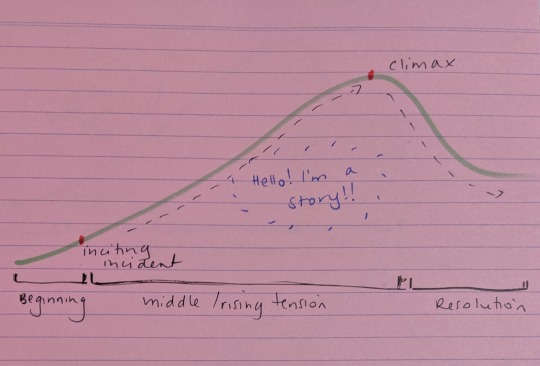
Look at this guy.
What a beautiful thing.
He’s a story.
It doesn’t matter if you’re reading Dr Seuss or Charles Dickens, when you read a story – when you strip away its words and its characters and its settings – this is what it looks like.
Or, well.
Not quite.
Really, it’s this guy:

But we’ll talk about him in a sec.
Right now, let’s talk about that first little inch:
The Beginning
The fact that stories have a beginning is not a surprise to anyone. Stories need them. In some ways, they’re the most important part of your story. After all, the job of the beginning is to set up the world your protagonist is about to leave behind. That is essential in grounding a reader / viewer – orienting them to the world that they’re in, and getting them invested in the story you’re about to tell, if not the protagonist.
Lord of the Rings, Harry Potter, Star Wars, Game of Thrones are all excellent example of this (and frequently used in teaching) because in each of these cases it’s literal. Frodo leaves Bag End, Harry leave Privet Drive, Luke leaves Tatooine, the Starks leave Winterfell. There is a literal departure from the world before the crux of the story, and that departure is what signifies the start of the ‘hero journey’ aka the main part of your narrative.
Of course, it’s not always literal – in fact, it’s usually not. Usually that world is symbolic – it’s the single, uncertain world before the Bingley’s buy the house next door in Pride and Prejudice or the dry domestic sphere of Breaking Bad before Walt decides to make meth. It’s a marked shift, whether that’s internal or external.
In Good Girls, it’s internal.
The beginning is actually pretty perfect. The world it sets up that we’re about to (try to) depart is one of struggle and invisibility.
Beth’s in a loveless marriage promptly discovering that her husband is not only cheating but about to leave them destitute, Ruby’s getting ignored by the healthcare system and can’t afford to pay for her daughter’s wellbeing, and Annie is in a dead end job about to lose custody of her child.
Writing-wise – as a beginning, I honestly think 1.01 is close to perfect.
It sets up who these characters are, their personal conflicts, and the story world they share together, and the worlds they have on their own i.e. Ruby at the hospital and the diner, Annie at Fine and Frugal, Beth with Dean and Boland Motors.
Then:
BOOM
Inciting Incident.
The inciting incident is also often called The Point of No Return.

When I’m teaching, I personally like to call it the “You’re a wizard!” moment.
It’s when something happens that means everything set up in the beginning will be changed forever. It’s Romeo meeting Juliet, it’s Katniss volunteering for Prim, it’s Frodo deciding to take the ring to Mordor, it’s Jaimie pushing a child out a window, it’s Beth – deciding to take her little sister’s joke seriously and rob a grocery store.
(Again, I like to use Harry Potter because it’s literal – there is no return for Harry after hearing Hagrid tell him he’s a wizard. Everything is changed forever).
Inciting incidents are probably the most singularly important narrative moment, because they’re what everything else tumbles out of. Pretty much everything that happens in the story should be a direct or indirect result of the inciting incident. The inciting incident is ultimately the key of the story and what should unlock the overall arc.
When it comes to a series – whether that be a TV series, movie series or book series, each individual instalment (see: season of a show) should have its own inciting incident which – preferably – builds off the one established in the first instalment.
The Hunger Games does this really well. Katniss and Peeta being brought back into the games in Catching Fire is both an imitation inciting incident which allows the author to explore the story world further in an exciting way, and also an inciting incident that’s directly borne out of the first book / film – aka Katniss pissed enough people off during the first games that they’re going to try and kill her for real this time, which in turn gives us the opportunity to explore Katniss’ trauma, the ramifications of her actions in the first book on the broader story world, and to generate a new, compelling chapter based off of both.
Good Girls has a terrific inciting incident in s1 – which is Beth realising she’s about to lose everything.
That is our narrative point of no return.
And it works on a lot of levels – it establishes Beth as the driving engine of the story, fuelled by the chorus motivations of Annie and Ruby, rounding off both their collective and individual stakes, it sets us up for a strong narrative spine and solid characterisations.
Good Girls actually also has a terrific inciting incident in s2, which operates strongly on its own while also building firmly off the character arcs of s1.
The s2 inciting incident is Rio showing up on that park bench with Marcus, a gun and an order.
The story pivots here – giving Rio a lot of narrative thrust (get your minds out of the gutter kids), and making him a sort of secondary story engine. The core engine is still Beth, but her life is different now. She’s been traumatised and she’s exhausted, but Rio revealing his son to the girls (and tying their motivations up together in a neat little package) while forcing her to act, re-establishes her as the person who’s decisions are going to be the driving force of the narrative.
Ruby and Annie are, of course, story engines in their own right too, but they fall into line behind Beth usually, and their narrative push is actually usually away from the story throughline, but we’ll talk about that in a sec.
Rising Tension / The Middle
Okay, this is where things get a little tricky.
Do you remember this guy?

When we talk about stories, rising tension / the middle is the big guy. It’s the bulk of your narrative. It’s Where Things Happen. It’s where all the ugly stuff set up in your beginning and exploded by your inciting incident just - - grows a life of it’s own.
Or - -
Well.
Maybe not.
Forget about this guy.
Rising tension is this:

Rising tension is a series of ‘mini climaxes’ on the way to the main climax that raises the stakes, lets you know characters better, and pushes your characters onwards to the main climax.
Each of these little climaxes should be followed by a ‘narrative rest’. (that’s the dip after each spike)
Which - - I don’t know, might sound weird? I know when I started writing I was like ?? but it’s true! The closer you get to a big narrative climax, the more important rests are! Rests are – I personally think – one of the most important components of storytelling, because they re-ground an audience, remind them of what’s at stake, before thrusting everyone back into danger.
Again, Harry Potter is a gift in this sense because this is all really clearly paced out. Think about the first instalment – Harry Potter and the Philosopher’s / Sorcerer’s Stone.
Harry and Ron save Hermione and Ron from the troll!!!
Then they become friends and enjoy school and quidditch.
Harry loses control of his broom during a quidditch game!!!!
He’s okay and then it’s Christmas and Harry gets the invisibility cloak and feels connected to his parents for perhaps the first time in his life.
Harry, Hermione and Ron go through the trapdoor to get the philosopher’s stone!!!
And - - okay, you get the point.
Each mini climax ups the stakes, but we feel those stakes upped because of the time we spend with characters during the ‘narrative rest’. For instance, while Harry and Ron saving Hermione from the troll might have sparked an interest in her, it’s the narrative rest scenes between that and her setting Snape on fire during the quidditch game that makes us invest in her as a character.
This is where things get a bit hairy with Good Girls. Good Girls does a tremendous job of giving us both great climaxes and wonderful moments of narrative rest. The issue, for me at least, is that it’s not always the best at balancing them. When I talk about escalation and pacing, this is a big part of what I mean.
Remember how I said this was the shape of a story?

Well, I think Good Girls s2 looked more like this:

We had a lot of solid movement in the first half of the season that sort of flattened out into a lower stakes, more meandering middle (which gave us 2.08 through 2.12). Which - -
Look.
The story changed gear, and it didn’t work.
Think of it this way:
2.01 – mostly character-based fallout from s1 + inciting incident of Rio handing them the gun
2.02 – almost entirely rising tension culminating with the girls bribing Boomer and Beth lying to Rio
2.03 – which thrusts us straight back into rising tension with the girls trying to kill Boomer and ‘succeeding’ via Mary Pat
2.04 – which gives us a very satisfying narrative rest as we explore Rio and Beth’s relationship outside of an overall narrative thrust – he gives her a key, she shies away from him, only to fall entirely back into him culminating in sex which itself brings about a new climax (no pun intended!) in the scene with Beth, Rio and Dean at the dealership. It’s also a strong character episode in closing certain plot threads – ending Annie and Greg’s relationship + ending Ruby lying to Stan about what they’re doing – while establishing major new threads – i.e. really colliding Turner and Mary Pat.
2.05 – and after the rest, we’re back to almost entirely satisfying rising tension! Building off of the threat of finding Boomer’s body and the new tensions that Rio and Beth’s intimacy brings.
2.06 – a mix episode! Very much building to the strong climax of Beth seizing power, but also an episode that plays around with character, has a lot of strong ‘rest’ moments i.e. the girls sorting pills and talking which gives us a lot of information as to state of minds, etc.
2.07 – again, very strong mixed episode which is focused on one single, extreme climax – Jane being missing, but building a very character-centric episode around it. Also introduces Noah though? Which is a mistake. He should have been introduced - I think, in 2.05, but that feels like a whole other post.
2.08 – narratively speaking the same as 2.07 in the sense of a single climax (the girls failing to get the money back / the Beth-Ruby confrontation), but has the added bonus of flashbacks.
2.09 – we have a slight narrative thrust with the robbery of the Quick Cash but it proves very quickly to be low stakes. This is an alllll emotional stakes episode, which means narrative tension is slowing.
2.10 – again, a character-focused, narrative rest episode devoted to Beth struggling with getting square. A few small climaxes – Annie and Ruby in Canada and Turner at the dealership being the big ones, but both quickly prove toothless. The heft / strength of the episode again is in character moments, not narrative thrust. Again - slowing it down.
2.11 – oh, what do we have here? Another character-focused, narrative rest episode? I love this episode – it’s one of my favourites of the show, but it’s intensely character focused. Very much centred in waving away the smoke around both Noah and Rio for Annie and Beth respectively. No dramatic climaxes. Slowing the story down even further.
2.12 – another narrative rest episode. A lot of slow exposition of Mary Pat and Jeff, which is good to know, but I’d argue placed badly in the season. This season’s already been slowing down despite the narrative timeline tightening, but this episode only further pushes on the brakes for Dean’s new job, Beth and Dean’s divorce, Beth and Rio’s break up. Two very small climaxes - the lawyer telling Ruby he knows about the money and the Boomer reveal but - in the context of the season - actually pretty low stakes. Again. Slowing down the narrative.
2.13 – A BIG CLIMAX EPISODE WHAT IS GOING ON???
What I’m saying in this is that the pacing in the back half of the season was, to me at least, fundamentally off. They hadn’t steered a strong enough narrative spine to take us through the season, and got heavily invested in character moments and not-entirely-thought-out-fallout in the back half of the season – it didn’t understand it’s own narrative thrust well enough to get us through. It also established a certain pacing with us in the first half of the season and shifted gears halfway through.
You can’t have your first three or six episodes be high-stakes-high-action, and then make the back end of your season same-stakes-low-action and top it all off with an explosive, poorly built-up finale in the way that they did.
There wasn’t enough thrust to push us through to the scene in Rio’s loft – neither narratively or in a character sense, and as a result, those last few episodes fall apart. Even beyond that though, the season escalated quickly then - - didn’t really know what to do with those escalations? It plateaued, which is indicative of bad pacing across the season.
I actually do think it’d be a relatively easy fix? I’d bring the Noah arc forwards and actually fiddle with the Beth and Rio break ups - get one even closer the tinale and make it more painful. Make it a climax in itself.
But anyway, haha:
The Resolution
All stories have a resolution too of course.
The resolution can be 30 seconds or 30 minutes – it’s a time to tie up loose ends and to reassure your audience that the journey they’ve been on is worthwhile.
(After all – you’ll notice the story diagram is not symmetrical – we never finish where we began).
I’m not going to talk too much about resolutions because at the end of the day – resolutions should fall fairly naturally out of your beginning, your inciting incident, your rising tension. It should tumble out like the double wedding at the end of Pride and Prejudice, but I will say that the s2 resolution was...err, not good. In no small part because it didn’t fall out of what we’d been told all season. They’d established a certain throughline and then taken it back, and that was nagl to be honest.
On the plus side though - it wasn’t a finale, so I have my fingers crossed they can fix it!
But yes, back to your ask, anon.
No, I don’t think that the writers were pandering. I think they went in with a sketched outline and that they probably got lost in the back end of the season and weren’t quite sure how to drum up the final act, which meant that final act didn’t work.
Ah, this post got so long! I hope it wasn’t boring or too self-indulgent or silly, and that you got something out of it! I am, of course, always happy to answer writing questions, and I hope you liked reading my story ramblings ;-)
60 notes
·
View notes
Text
A 20-Year Legacy of Support for French Artists

A show at the Pompidou Center highlights the work of Kapwani Kiwanga, winner of the Marcel Duchamp Prize, and those who won before her.

Kapwani Kiwanga’s “Flowers for Africa” is a series of installations that consist of elaborately arranged fresh flowers. © Dmitry Kostyukov for The New York Times
PARIS — The conceptual artist Kapwani Kiwanga, whose latest exhibition here recreates elaborate floral arrangements from archival photographs to capture a moment in time, was awarded the Prix Marcel Duchamp on Monday in a celebration that also marked the 20th anniversary of the prize.
The award, viewed as France’s answer to Britain’s Turner Prize, is named after one of France’s most influential 20th-century artists and is given to an artist born or working in France. Ms. Kiwanga, a native of Canada, works in Paris.
The winner was announced by Bernard Blistène, director of the Musée National d’Art Moderne at the Pompidou Center.
“At a time of rising nationalism around the world, it is important to emphasize that this is not a ‘nationalistic’ prize, but the recognition of an international artist who is part of the French art scene,” said Mr. Blistène, who also presides over the seven-person jury. Members include Gitte Orskou, director of the Moderna Museet in Stockholm, and Marie-Cécile Zinsou, president of the Zinsou Foundation in Benin, in West Africa.
The award ceremony at the museum went ahead despite the pandemic that forced the cancellation of the annual International Contemporary Art Fair, or FIAC. The fair, which would have opened on Thursday, is usually the focal point of a buoyant week of art-filled events in the French capital. This year, the ceremony was held against a background of global travel restrictions compounded by a local nighttime curfew in place in Paris.
“It isn’t because we are going through a terrible period that this public institution should not stand for hope for the future,” Mr. Blistène said.
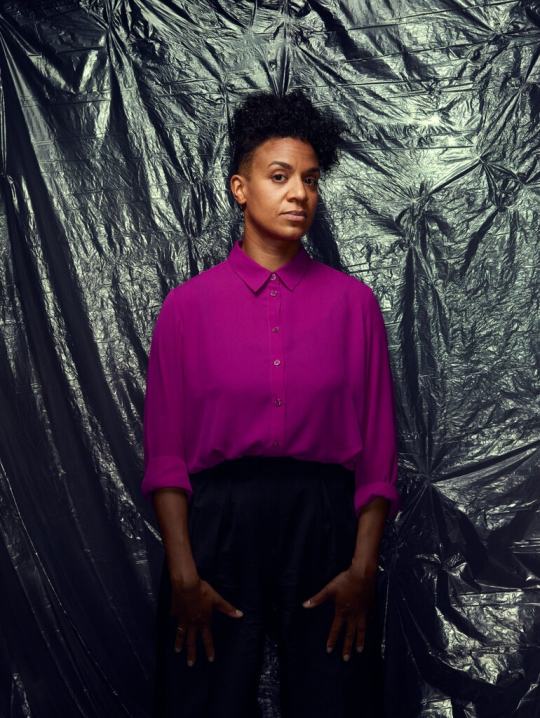
After studying anthropology and comparative religion at McGill University in Montreal, Ms. Kiwanga attended the École des Beaux-Arts in Paris. © Manuel Braun
With the prize Ms. Kiwanga was awarded 35,000 euros (about $41,000). The other nominees were Alice Anderson, Hicham Berrada and Enrique Ramírez, selected by a committee of the Association for the International Diffusion of French Art, a group of about 400 art collectors that created the prize.
The appropriation of history is the subject of “Flowers for Africa,” a series of installations by Ms. Kiwanga that consist of elaborately arranged fresh flowers, suspended as a garland from the ceiling or set in bouquets on pedestals. Each is a “reconstruction” of a floral arrangement the artist has gleaned from an archival photograph of an official ceremony marking the independence of an African country.
“The flowers wilt and dry over time and must be replaced according to a protocol,” said Ms. Kiwanga, who is 42. “They capture a moment in history.”
Sophie Duplaix, the chief curator at the Pompidou Center, where works by the nominees will be displayed through early January, said that “all four artists have touched on the notion of time and its impact on the individual and society.”
“That common thread helped us bring harmony to a show that we hope will resonate with the public, especially in a period when we are all reconsidering our own relationship with time,” she said.
In “Flowers for Africa,” Ms. Kiwanga examines that connection by confronting history and botany. History is retold through the life cycle of flowers left to wilt for the duration of the exhibition. Her reconstruction of ceremonial bouquets underscores the shortcomings of capturing history.
“The project was born out of my own frustration at looking at images that seemed always to depict political leaders present at independence ceremonies,” she said. “I wanted to look beyond those central figures and focus on the flower arrangements, which were witnesses on the sidelines of those historical events.”
After studying anthropology and comparative religion at McGill University in Montreal, Ms. Kiwanga attended the École des Beaux-Arts in Paris.

Hicham Berrada’s “Présage, SiO2” is a 12-minute video showing the reaction that occurs when he pours silicon dioxide to activate a controlled chemical reaction in a glass tank filled with a mixture of acid and water. © By Dmitry Kostyukov For The New York Times
This year is also the 20th anniversary of the Duchamp prize, and to mark this milestone, a six-month exhibition at the museum honors previous winners.
“I believe in French art for its spirit, its elegance and its joie de vivre,” said Gilles Fuchs, a collector and president of the association.
“This prize recognizes an artist whose innovative practice is representative of a generation and reflects the creativity of the French art scene,” he added. “The 20th-anniversary show is evidence of our continued support of the artists.”
Mr. Blistène said the award “is not driven by ‘market’ interests.” He added that the association collectors “are not motivated by commercial interests nor by mundane or ‘domestic’ considerations like whether they can hang the art in their living rooms.”
Among the other nominees, Mr. Berrada’s artistic practice sits at the junction of science and nature. His installation, “Présage, SiO2,” is a 12-minute video showing the reaction that occurs when he pours silicon dioxide, a component used in making concrete, to activate a controlled chemical reaction in a glass tank filled with a mixture of acid and water. A mesmerizing landscape of moving shapes is captured in the video, projected onto a large screen. Mr. Berrada, 34, a native of Morocco, lives and works in Paris and Roubaix, in northern France.

Alice Anderson’s work is made up of drawings, dance movements and totemic sculptures constructed from everyday objects wrapped in copper thread. © Dmitry Kostyukov for The New York Times
The French-born Alice Anderson, 47, reflects on memory in a presentation made up of drawings, dance movements and totemic sculptures constructed from “recorded” everyday objects — like a computer mouse or a mobile phone — wrapped in copper thread, that connect man to technology.
“Technology is driving a change of civilization,” Ms. Anderson said. “These objects are mummified to be preserved.”
On a wall in the space dedicated to Mr. Ramírez, 41, a Chilean multimedia artist who lives and works in Paris and Santiago, are the words: “The future always repeats itself inseparable from the past.” The sentiment ties together several pieces that touch on issues of migration and history.
At the center, a video depicts a man entangled in the twisted fabric of a sail floating in the sea, in what could be interpreted as either a slow struggle for survival or a metaphor for a return to the fetal state inside a womb.
“The sea and the sail evoke both freedom and failure,” Mr. Ramírez said. “My work is less about politics and more about poetry.”

Enrique Ramírez’s work at the Pompidou Center includes a video of a man entangled in the twisted fabric of a sail floating in the sea. © Dmitry Kostyukov for The New York Times
Mr. Fuchs said the ADIAF (it is referred to with its French abbreviation) was founded in 1994 to promote the nation’s art. At the time, French artists were at a low point, their work was being purchased only by the state, and there were few private French art collections.
“Matisse had not been dead very long, yet the French art scene was completed discredited to the point that some even referred to Marcel Duchamp as an American painter,” Mr. Fuchs said.
“But thanks to the support of the Centre Pompidou from Day 1 and our own efforts, this prize has gained the prestige it has today,” he said.
The prize is less a launchpad for young artists than a spotlight on a body of work by more established names like Kader Attia, the 2016 winner, who went on to receive both the Joan Miró Prize and the Yanghyun Prize the next year.
For many past winners, the prize has been a genuine boost to their careers, particularly thanks to the three-month show at the Pompidou.
“All prizes and encouragements are welcome in the life of an artist,” Thomas Hirschhorn, a Swiss artist who was awarded the first prize, wrote in a statement to the French press ahead of this year’s announcement.
“As an artist, I need my work to be shown, talked about and critiqued,” he wrote. “What is concrete about this prize and what really mattered to me were the prize money, the funding I received from ADIAF for a new piece, and my show at the Centre Pompidou.”
Laurent Grasso, a French multimedia artist who won in 2008, noted the attention the prize brought him. “Some 45,000 visitors came to my show at the museum,” he said. “This prize generates a lot of positive energy around the work of an artist.”
Upstairs, in the main galleries of the museum, works by all 19 past winners are displayed among pieces from the museum’s permanent collections.
“The dialogue with our historical pieces shows how more recent works fit into an ongoing artistic tradition,” said Nicolas Liucci-Goutnikov, the curator of the show.
“Some people consider contemporary artists to be engaged in a perpetual reinvention of art,” Mr. Liucci-Goutnikov said. “But this show demonstrates that art is a heritage being constantly renewed.”
[Source]
2 notes
·
View notes
Photo
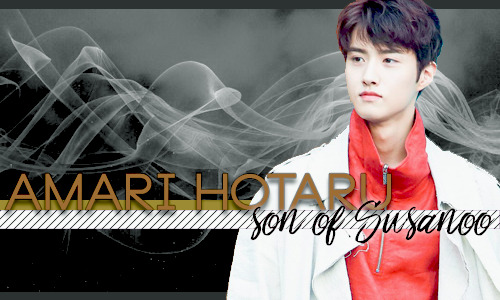
We have a new citizen in Mount Phoenix:
Amari Hotaru, who is known by no other name;
a 22 year old son of Susanoo.
He is a swimming instructor at Zero to Hero
and host at Sakura.
FC NAME/GROUP: Yeo Changgu/Yeo One (PENTAGON)
CHARACTER NAME: Amari Hotaru
AGE/DATE OF BIRTH: 22 Years/March 27, 1998
PLACE OF BIRTH: Shodoshima, Japan
OCCUPATION: Swimming Instructor at Zero to Hero/Host at Sakura
DEFINING FEATURES:
- Somehow almost always smells like the ocean.
- Tall, tanned, fit, and smiley :)
PERSONALITY: Boyish, friendly, upbeat, and kind, Hotaru is a reflection of all the love he was given growing up. The easiest way to explain it being that his mother, uncle, and aunt had poured so much love into him, that at some point, all that warmth and tenderness brimmed over and spilled out into the world in the forms of compassion and care. He’s a whirlwind of joy, excitement, and best intentions. If someone were standing in the park with a “free hug” sign, not only would he take a hug, but he would join them in offering free hugs himself. If someone was caught in the rain without an umbrella, he would hand his own over to them, no problem. If someone showed up at his door in the middle of the night with nowhere to go, you bet your ass, he would take them in, and give them his bed in a heartbeat. Some would say that he’s a bit of an extreme altruist, others would call him extremely naive.
Despite the fact that he’s almost exasperatingly positive about everything, he can be just as insufferable when his feelings are hurt. He’s got a little flair for the dramatics especially when his feelings are hut. If it’s sunny out and there’s a sudden downpour, chances are Hotaru had his heart broken again. Or he watched another tragic show or movie. But he bounces back fast. Never one to dwell on his negative emotions for longer than a couple of days unless he’s really hurt. He’s an expressive person, an open book, wears his heart on his sleeve for everyone to see. He’s a little lovesick too. Love crazy at times with how he has a new(unrequited) crush every other week despite his better judgement. And a little chaotic with some of the poorer decisions that he makes. Overall, he’s a good person, but a little bit of guidance wouldn’t hurt him either.
HISTORY: tw: mentions/heavy implications of chronic illness, mental illness, and suicide.
Hotaru’s childhood had been a happy one. He had grown up healthy, taken care of, and though he couldn’t have everything he asked for, he knew he was loved. Now that he’s older, he can appreciate how lucky he was. He was given more than what some others get. Yet, that doesn’t change the face that there’s still a handful of things he wishes could’ve been different.
Though his mother did have a presence in his life, she wasn’t the one who raised him. As soon as he was born, she had given him over to her adoptive brother and his wife. The reasoning behind this decision only ever being hinted to him through cryptic words that skirted around the entire truth. It wasn’t until Hotaru was well into his teens that he learned why exactly.
“Your mother… Isn’t well, Hotaru…” his uncle had explained to him when he’d asked the first time. “She’s doing her best to get better, but right now she can’t take care of you… Hopefully when you’re older and she’s feeling good again, you can go on to live with her.” And that was that.
His uncle and aunt had taken him in without any fuss though. They treated him like their own, but made it clear to him that they weren’t taking his mother’s place in his life or trying to keep him from her. He was allowed to see her most weekends and she visited him as frequently as she could during the summer and winter.
Years later, when Hotaru is ten, the offer to live full-time with his mother arises. Naturally, Hotaru is eager and excited. He jumps on the opportunity without really thinking about it. Not that he doesn’t love his aunt and uncle, but his childhood wishes to be with her as much as possible finally comes true. Just as naturally, his aunt and uncle are apprehensive, but they’re supportive nonetheless. The couple couldn’t be any happier for the mother and son duo and wished them all the best.
Come the next summer, Hotaru’s mother whisks him away from his hometown and out to her modest apartment in Tokyo. The city is very different from what he’s used to, but with his mother by his side, he adjusts to everything well. The next few years are happy ones. He makes so many good memories with his mother that at times, he can hardly remember any of the heartache and pain that comes next.
He’s thirteen, when things start to change. His mother’s mood shifts and Hotaru finds himself helplessly watching as she withdraws from the world and him along with it. When he asks her if she’s alright, she dismisses his concerns with a gentle smile and a ruffle of his hair. “I’m alright,” she would say or, “Don’t worry about me, I’m just a little stressed.” Every time she does, he so desperately wants to believe in her words, but he knows deep down that there’s something she’s not telling him.
Around the same time, his powers start making themselves known, but he brushes them off as coincidences and they’re more or less shoved to the back of his mind. He has other things to worry about and worry he does. Between then and now, things get progressively worse and worse. It’s not until he gets his uncle and aunt involved that things improve again, but the relief and happiness is short lived.
He’s fifteen years old when he comes home from a swim meet, his aunt and uncle in tow, the older couple chatting with him about school and congratulating him on the silver medal he wears around his neck. When he calls out into the apartment to greet his mother and receives no response, but he dismisses it. Figures his mother is still resting in her room. But there’s an unnerving stillness in the air, like the calm before a storm, and Hotaru can’t shake the feeling that something’s wrong. He tries to keep his cool though, chuckles a little nervously when his aunt and uncle give him a worried look before going off to check on his mother.
The couple watches as he disappears around the corner and over to her bedroom calling out for her once more before he stops mid sentence and something thuds to the ground. They glance at each other. The scream that they hear next is so loud and so heart wrenching and so pained that it stuns them for a minute before they’re rushing after him.
The scene that they come across next is surreal. Hotaru collapsed to the ground in a fit of inconsolable tears and anguished cries hunched over his mother’s lifeless body. For as long as they’d known the boy, he’d never made a sound so heart breaking in his life. It shakes them up even more. Outside, thunder cracks in the distance and there’s a sudden downpour, but the only storm they can focus on is the whirlwind of grief that comes next.
After the funeral and his mother’s cremation, Hotaru moves back home and he isn’t himself for a long time. Years of counseling, therapy, and the support of his family help him along the way and he’s better for it, but there’s something fundamentally different to him regardless.
On his eighteenth birthday, his aunt, uncle, and a few friends gather together at the beach to celebrate. It’s a happy occasion, but he can’t help but wish for his mother’s presence there. The very same night, after returning home for the evening, his uncle pulls him out to the back porch and hands him one last gift. A modest sized box with an elegant looking envelope on top. There’s a bit of weight to it and when he opens it, it reveals a series of black journals. He flips the envelope over to see it addressed to him with his mother’s handwriting on the back of it. The young man looks up in confusion and his uncle explains.
“She wanted you to have these when you were sixteen, but we thought that it would be too soon after…” he pauses, eyes glossing over with tears that he does his best to blink away. He clears his throat, “I’m not sure what’s in the journals, but she wrote them all for you to read when you were old enough to understand… But read the letter first. There’s something important in there that she wanted you to know, I think.” He wishes the demigod another “happy birthday” before going to bed for the evening.
Hotaru sits there in the dark for a while, twirling the letter by its corners tentatively while he debates opening it like his uncle insisted. It’s a while before he can muster up the will, but he eventually does and the contents of the letter leave him speechless. He’s not sure whether the line of, “You’re a demigod, Hotaru,” holds any truth to it at first, but his doubts disappear when he manages to stop a sudden rain shower with nothing but a wish. Of course, he repeats it a few times for good measure, but the action confirms his mother’s words to be true.
After putting himself through university and earning himself a degree in honor of his uncle and aunt’s wishes, he was finally able to set off to the place his mother encouraged him to go to in her letter. He’s twenty-two when he arrives at Mount Phoenix and despite not knowing entirely what he’s there for, he’s looking forward to the new atmosphere and learning more about this side of his heritage.
PANTHEON: Japanese
CHILD OF: Susanoo
POWERS: Can summon and control storms for a short time. They are particularly powerful near oceans and salt water restores their energy.
STRENGTHS: He’s compassionate, kind, and caring, a good swimmer, all around good human.
WEAKNESSES: Attractive people, sad animes, his own emotions, a little chaotic, cares a little too much sometimes.
1 note
·
View note
Text
Orphans of the Storm: Attachment, Trauma and the Developmental Trajectories of Lelouch and Nunnally in Code Geass
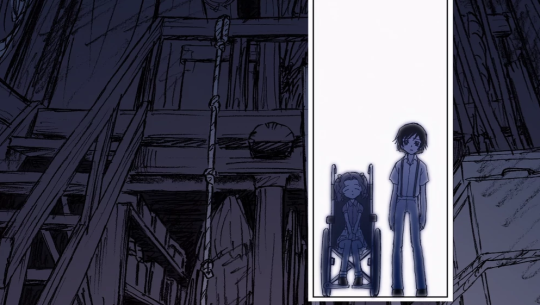
Alternatively titled, Matt Has a Lot of Thoughts About the Lamperouges. 7000+ words of thoughts, to be exact. Some of them might even be semi-intelligent. Admittedly, much of this was written from a hospital office while procrastinating writing patient journals for actual patients who are real humans and not fictional characters. Thank you to my supervisor for not supervising me very much.
I. Introduction
First, let us first briefly set the stage. The story of Code Geass is set in an alternate universe where the social-darwinist, imperialist superpower The Holy Britannian Empire is ruling large parts of the world. Lelouch and Nunnally vi Britannia are born into the royal family as children of 98th Emperor Charles zi Britannia and one of his consorts, Marianne. After their mother is assassinated in a terrorist attack at the Imperial Palace, an incident which leaves Nunnally blind and paralysed from the waist down, the two are sent to Japan as political hostages. The Britannian Empire then invades Japan shortly after they arrive, and they must seek refuge with the Ashfords, a wealthy family with ties to their mother Marianne. Presumed dead by the rest of the royal family, they take on the surname Lamperouge and begin to live in hiding in the now-colonised Japan, renamed Area 11.
These events constitute what is to become Lelouch’s raison d’être through the entire series - finding out who assassinated his mother, and creating a safer, kinder environment for his sister to grow up in. Nunnally is an extremely, and I cannot stress this enough, extremely important figure for Lelouch through the entire series (to the point where it’s kind of a joke in most spin-off material). He’s her main caregiver along with their maid Sayako, and protecting her is his primary goal - often at the expense of his own safety, his friends’ safety, and/or massive collateral damage. In this essay, I will analyse their relationship with their parents and each other through the lens of attachment theory, and discuss how these dynamics shape their developmental trajectories as they grow up. I will focus on two domains of development in particular: (1) emotional regulation and (2) identity. Based on this analysis, I’ll make the argument that Nunnally, despite being the one experiencing the most trauma, ended up more well-adjusted than Lelouch. Furthermore, although the series places much emphasis on how Lelouch is the one protecting Nunnally, he is actually more dependent on his sister than she is on him. I will also discuss how these central themes tie into Lelouch’s goals and political ideology.
II. Ode to My Family: The Fundamentals of Attachment Theory
Attachment theory is a psychological theory originating from the work of John Bowlby, concerning the bond between caregivers and their children. Put simply, Bowlby proposed that children are biologically predisposed to form deep, lasting bonds with their caregivers, and this bond has an important influence on subsequent development. In the attachment relationship, the caregiver functions as both a secure base from which to explore (for example, a child feeling safe when playing knowing a parent is nearby), and safe haven to turn to for emotional support (if they get scared or hurt when playing). Caregivers, on their end, facilitate secure attachment through moderate and appropriate stimulation of the child, warmth, mutually responsive interactions, and other behaviours that promote ‘connectedness’. Especially interesting is a trait called mind-mindedness, which can be described as a caregivers ability to conceptualise their child as an independent person, understand their mental/emotional state and respond appropriately. Important to note about attachment bonds is that they’re not “horizontal” - the caregiver and child aren’t on the same “level” as mutual attachment figures to each other, but the caregiver (as the older, wiser, and more experienced person who is able to provide care) will be a figure that the child can rely on.
A healthy attachment bond has a variety of important functions. It promotes the growth of self-reliance (which promotes independency), increases capacity for emotion regulation, promotes later social competence (such as empathy and mutual relationships), and is important for later identity development. This happens through the acquisition of so-called internal working models, that the child employs through their life. To simplify a bit, think of attachment as the mechanism by which caregivers, through their behaviour, teach children what to expect from the world around them, and what strategies to employ to best cope with it. At its core, it is about seeking security and safety - a form of healthy and adaptive dependence that provides a solid foundation and sense of security from which independence can grow
There are three main classifications of attachment bonds - secure, insecure and disorganised. Securely attached children will develop positive internal working models, where world is a fundamentally safe place, they are loved and worthy of that love. Interactions with the caregivers are frequent, mutual and predictable. For insecure attachment, there are two subcategories: avoidant and ambivalent. Insecure-ambivalent attachment is associated with unpredictable interaction styles, where some interactions between caregiver and child may be warm and mutually responsive, while others are more detached or unpredictable. This leads to frustration and confusion, and an ambivalent relationship. Insecure-avoidant attachment, on the other hand, is typically associated with a non-responsive and uninvolved form of care, or an absent caregiver. In this case, the child may feel rejected and like they cannot rely on anyone. Disorganised attachment simply means there is a lack of any organised form of attachment, but that’s not going to be relevant here so let’s ignore that one.
In summary:
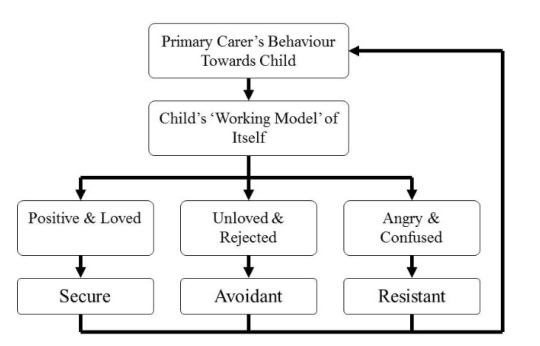
Did you really think you were getting through this one without at least ONE chart? (Note: ambivalent and resistant attachment is the same thing)
Also, important note before moving on from this bit: (1) Attachment is not the be-all end-all for positive/negative developmental outcomes, and (2) I’ll obviously be a bit quicker to assume correlation and draw conclusions than I would in real life, because in my mind applying this stuff to literary analysis vs. applying it to real people are two completely different things. Fiction consists of a series of deliberate choices of storytelling and elements you can easily pick apart and draw lines between (preferably with red string on a corkboard wall, while looking slightly manic), whereas people are, like, more complicated and stuff - nature and nurture and all that.
Now, with attachment theory in mind, let’s have a look at the evil Britannian disaster parents.
III. The Mother We Share: (In)Secure Attachment in the Imperial Palace
Before taking a deep dive into Lelouch and Nunnally’s relationship with one another, it’s essential to discuss their relationships with their parents. Unfortunately for me, there really isn’t much canon material regarding their lives prior to Marianne’s death and the subsequent exile in Japan. However, even with the limited information available, I think it’s fairly safe to say neither Charles nor Marianne deserve a parent-of-the-year award - a point cleverly foreshadowed by me when I referred to them as evil disasters just a few sentences ago.
As for Charles, I hardly need to even make a case that he probably wasn’t a great father. It’s never outright stated in the series, but I’m going to assume they had minimal or no contact with Charles. The main reason behind this is: why would they? He had 108 (!) consorts with whom he had many children, and was busy ruling the largest empire in the world. And as if that wasn’t enough, Lelouch and Nunnally weren’t even particularly high up in in the line of succession and would have been unlikely to ever rule in their lifetime (if it hadn’t been for, er, circumstances). Furthermore, because of his grand plan to fuse humanity into one collective unconscious through the Ragnarök Connection, none of this would matter to him anyway. Additionally, I think his lack of contact with his children is very apparent through the way Lelouch interacts with his father when confronting him about Marianne’s death, which I’ll get back to.
So, we can reasonably conclude Charles was an uninvolved/absent caregiver. However, things get a little more interesting with Marianne.
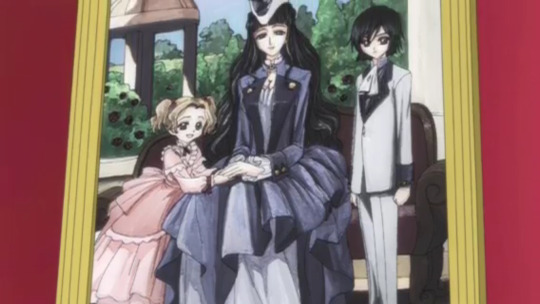
This isn’t relevant to the topic or anything, I just think it’s neat how they made Lelouch so visually similar to his mother. In addition to physical traits, Marianne’s dress here has a really similar structure to what would later become her sons rebellion outfit of choice. She even has a chess-piece-esque hat to go with. Then again, I suppose the alternative was making him visually similar to Charles, and that wouldn’t make for a lot of good fanservice now would it. Anyway, this image description is too long.
As mentioned, avenging his mother’s death is one of the most significant driving forces for Lelouch throughout the series. Her assassination impacted him greatly, both in and of itself and through the harm it caused Nunnally. Whenever she’s brought up, they both seem to get visibly downhearted, and there’s never any indication they remember her anything but fondly. In picture drama 22.25 (from their time as children in the Imperial Palace), the Britannian siblings find a commemorative plate that belongs to her in Euphie’s room. They start to bicker over it, because Nunnally wants to have it herself, while Lelouch thinks Euphie should keep it because it belongs to her. This all indicates that the royal children admired Marianne, and she was obviously an important figure to them both. Through this idolisation, as well as Lelouch’s obsession with what happened at the Imperial Palace, the narrative seems to want us to assume she was a good parent.
However, there are a few things that call into question how reliable of a narrator Lelouch actually is concerning Marianne. Towards the end of the series, it’s revealed that she is actually very much alive, and completely on board with Charles’ Ragnarök plan - making her one of the series’ main antagonists. During Lelouch’s final confrontation with his parents in C’s World in S2 E21, she is unable (or unwilling) to see how faking her death, traumatising her children, shipping them off to a country the Empire promptly invaded without ever making sure they’re still alive, and then trying to convince them to get on board with her human instrumentality plan is wrong. As her wiki bluntly states: “She only superficially loves her children and will not hesitate to kill them if they get in her way.” Taking this information about her character into account, I consider it more likely that the reason Lelouch and Nunnally idolised Marianne was either (1) because they based their impression largely on her reputation, rather than because she genuinely was a loving mother, or (2) she was a very good actor.

At least she provided some strategies to prepare her children for having to cope with the emotional trauma she was about to inflict on them.
How to make sense of their relationship with Marianne from an attachment perspective? I think this is largely up to interpretation due to lack of pre-series material. Lelouch and Nunnally both seem to like and look up to her, but that does not necessarily indicate secure attachment. I would argue they had an insecure relationship with Marianne, and that argument is based on two things. First, her personality traits and actions (rather than Lelouch and Nunnally’s accounts of her): she blatantly uses her children as pawns for her plan, and doesn’t care all that much that they were suffering as a result. Even though she does argue all her planning was well-intentioned, this act quickly fall apart when Lelouch challenges her. As C.C. tells her, “the only people you love are yourselves”. Calling this sort of behaviour “poor mind-mindedness” or “lack of parental warmth” is an understatement - I simply don’t see a scenario where Marianne would genuinely care.
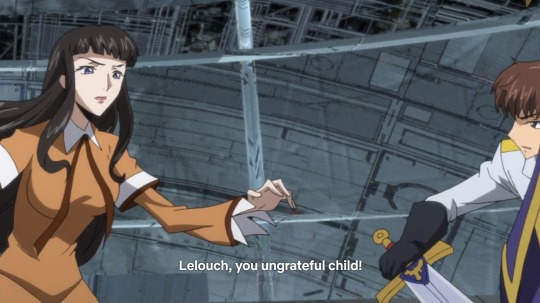
Secondly, I’d argue you can infer it from Lelouch’s patterns of behaviour as he grows older. Many of his actions, and the themes surrounding him as a character, could be seen as a manifestation of insecure attachment - his attitude towards Nunnally, attitude towards his friends in the student council, his emotionality, and the general theme of a fragmented identity, to mention some. But I’m getting ahead of myself. Point is, there is good reason to believe Lelouch or Nunnally had any form of secure attachment bond to either of their parents, and this has some implications for their development as the series goes on.
IV. Abandoned by the Empire: Trauma and Parentification
In addition to not having the best relationships with their parents to begin with, Lelouch and Nunnally were then burdened with more baggage after their mother’s death. In Nunnally’s case, her trauma from the incident was primarily physical (blindness and paralysation of her legs), due to her being literally in Marianne’s arms as she was shot. Lelouch was a witness, and escaped without physical injury. Afterwards, while his sister is still in hospital, he takes it upon himself to confront his father about what happened, and accuses him of having allowed, even facilitated, the assassination through purposefully neglecting security measures that day.
While Nunnally was by all means most harmed by the attack, it is here in the aftermath I’d argue Lelouch takes his “main blow” in the parental trauma department. When confronted, Charles gets angry and tells Lelouch that everything in his life has been handed to him by virtue of being a child of the royal family, and thus he’s never truly accomplished anything - he might as well be dead, and therefore has no right to doubt or disobey him. This is an especially cruel statement in the context of the social-darwinist Britannia, where the strength to survive by your own measures is seen as highly important, maybe even the only thing that truly is important. Lelouch then visibly flinches and falls back when Charles stands up, in a manner that seems outright terrified. Keep in mind, all this is happening in front of the Royal Court.
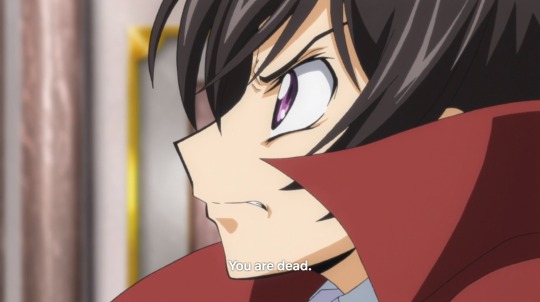
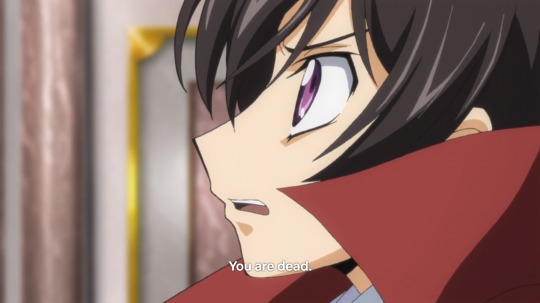
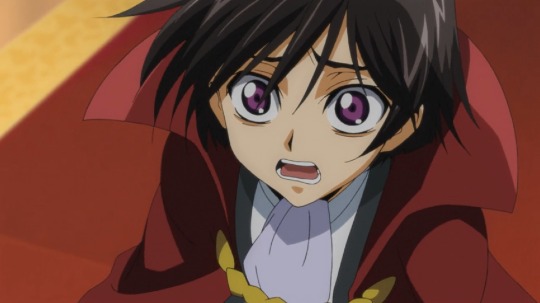
This scene in particular is the main reason I cannot imagine Lelouch or Nunnally having any kind of relationship with Charles prior to the incident, much less a secure and healthy one. You’d think the threshold for a young child to turn and publicly accuse his father of premeditated murder in front of the Britannian Royal Court would be astronomically high, especially if he actually liked and trusted him. Additionally, as I mentioned earlier, one of the most important functions of the caregiver is being a secure base in difficult and unsafe situations, which means that children typically tend to turn towards their parents during situations where they feel scared. Flinching away (so severely he even falls back, with a horrified expression on his face), rather than seeking closure, is highly indicative of insecure attachment/parental neglect.
As if all this wasn’t enough, Lelouch and Nunnally are then separated from all their siblings to be relocated to Japan as political hostages. Again, the pre-series material is pretty thin, but throughout the series there are indications that they had good relationships with some of their siblings. For example, Lelouch recalls playing chess with Schneizel, and possibly had some kind of relationship with Clovis judging by their conversation before Lelouch kills him. Both Lelouch and Nunnally also seem to have been very close with Euphie - in Stage 22.25, they’re playing in her room and don’t want to go to sleep because they’re having so much fun. Lelouch even refers to Euphie as the first girl he ever loved (let’s just... not unpack this one). Point is, not only do they get traumatised by and separated from their parents (whom they already had an insecure relationship with), but they’re also ripped away from their entire network of social support, except for each other.
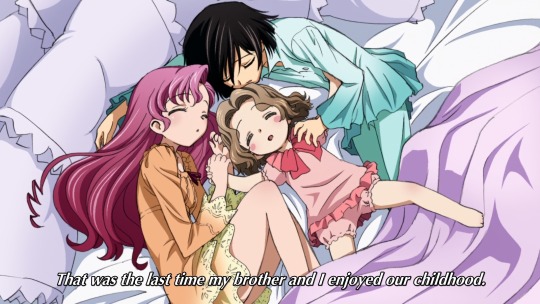
This image is so fucking sad. Fuck.
So, when Lelouch and Nunnally arrive in Japan, they’re on their own. And because he is older, and because of Nunnally’s disability, Lelouch ends up taking on most of the responsibility. He carries her up the stairs when they arrive at the shrine, washes their clothing, buys their food, and so on. In addition to these practical tasks, he also tries to comfort his sister emotionally and seems to also feel responsible for her well-being - for example, when discovering their lodgings were small and quite sad-looking, he tries to shield Nunnally from it by lying and telling her it looks like Euphie’s room. When Suzaku first meets Nunnally, Lelouch instantly runs into the room because he heard a noise, and freaks out at Suzaku because he thinks he’s going to harm her. For all intents and purposes, he steps into a caregiver role for his sister - an attachment figure, one might even say. This shift in their dynamic becomes very apparent when comparing their relationship in Japan and onwards, to the aforementioned bickering-over-a-plate incident in Euphie’s room, where they were fighting and playing like siblings.
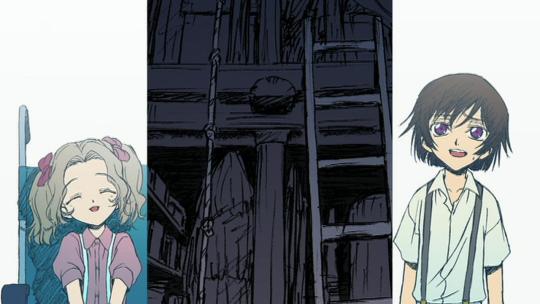
This phenomenon is sometimes called parentification, in which the absence of adult figures providing sufficient care causes one child to bear more responsibility than is normal for the age, and step into the role of “parent”. Parentification can be adaptive and healthy with concrete/practical tasks, in small periods of time and with plenty support, for example pre-teens babysitting their younger cousins. Suffice to say, Lelouch had none of those things. He is Nunnally’s sole contact, made worse by himself by being stubborn and not wanting to let anyone else in to help. Additionally, plenty of other risk factors for destructive parentification is present - the tasks are diffuse, all-consuming and way above the level appropriate for his age, he gets no sort of recognition, reward, or help, it lasts a long period of time (permanently), generational lines become somewhat blurred, and his own needs end up taking second priority to him. And, as you’ll remember from the attachment theory section, this kind of relationship is not horizontal in nature - Lelouch and Nunnally don’t provide each other mutual support of this nature, but rather Lelouch is the one providing a function for Nunnally.
In the beginning of this section, I mentioned that Nunnally’s trauma as a result of Marianne’s death was primarily physical. However, she evidently went through a great deal of psychological trauma as well. A novel detailing their childhoods in Japan states that Nunnally privately had a terrible time coping with the changes in her life and would throw tantrums when left to her own at Kururugi residence, destroying nearly anything she could get her hands on. However, unless she secretly throws tantrums whenever her brother is off screen, this doesn’t seem to be an issue during the span of the series. I’d argue this could be attributed to Lelouch functioning as a caregiver for her - she had someone there to help her, calm her down and provide external emotional regulation, which in turn helped her learn to better regulate her emotional states on her own. Lelouch provides safety and warmth, and, in doing so, becomes a buffer for his sister.
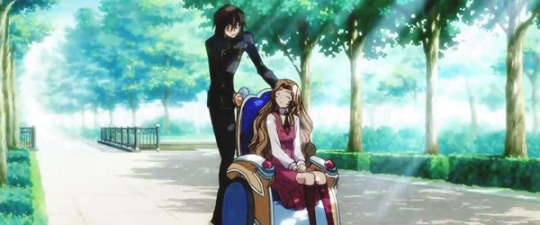
Lelouch, however, has no such buffers. Because of this, it’s easy to draw a line between his parental problems and trauma, and his subsequent maladjusted pattern behaviour when the siblings arrive in Japan. At the Kururugi residence, both him and Nunnally are offered both food and clothing, but he is insistent on providing everything himself - he washes all their clothes, and buys their food with coupons in town, despite being beat up by the other boys there for being Britannian. He’s distrustful towards everyone there (before later warming up to Suzaku) and hypersensitive for any possible threat to Nunnally’s safety. In my opinion, it’s evident Charles’ words had an impact on him. When Suzaku asks why he is so hellbent on refusing help, he responds with: “I’ll live by my own strength, and I won’t be dead any longer!” Through caregivers, children learn what to expect from the world and their own place in it - in Lelouch’s case, he clearly sees the world as an unsafe place with few people to truly trust, and considers himself only worth something if he is entirely independent. Although independence is often seen as a “mature” trait in children and therefore indicative of “good” development, healthy dependence and attachment in childhood is crucial for the facilitation of later healthy independence. And unlike Nunnally (who has him), he doesn’t have anyone to rely on and turn to for his security.
Diverting slightly from the topic at hand, I think this highlights the interesting narrative role of C.C. as the closest thing Lelouch has to a caregiver proxy. I am in no way trying to imply she is outright maternal towards him, but she’s of help and offers practical and sometimes emotional support - a role no other person in Lelouch’s life really fills. I already explained why Nunnally isn’t a possible candidate, and Suzaku, while an important figure in Lelouch’s life, has his own essay-worthy plate of parental problems to deal with. Additionally, their whole enemy situation doesn’t make him someone Lelouch can reliably turn to for comfort and support. C.C however, is older, wiser, more “stable”, and seems to know how to offer emotional support in a way that somewhat calms Lelouch down. In turn, he occasionally tries to reach out to her in difficult situations (or at least he gives into having breakdowns in front of her), which he doesn’t seem to do with anyone else. If only she’d intervened when he was a child instead of just standing there dramatically in the background. But alas.
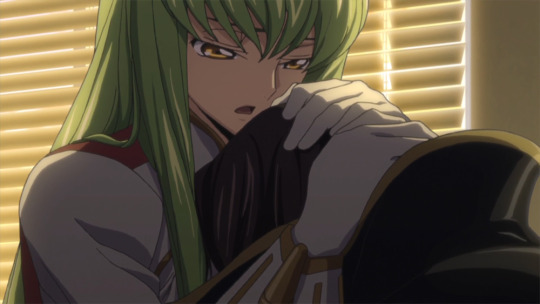
V. Some Things Just Stick in Your Mind: Differential Susceptibility
Earlier, I briefly mentioned Nunnally being the one most harmed by Marianne’s death. She was younger when it happened, more directly involved, and experienced a greater loss of function as a result which altered her lifestyle significantly. Based on this, I could easily argue that the incident would have far more damaging implications for her long-term psychological well-being compared to her older brother. I could, but I won’t, because it didn’t. Despite all these risk factors present in Nunnally’s case, their mother’s death seems to have made far more of a long-term impact on Lelouch. We’ve already discussed the most important reason why: Lelouch providing Nunnally with protective care associated with a secure parent, thus functioning as a buffer for her trauma. In this section, I’d like to discuss another important factor, interacting with attachment security: namely, differential susceptibility (also sometimes called responsiveness for care).
When we meet Lelouch in the beginning of Code Geass, he feels stuck and utterly powerless in his situation. He gambles on chess to pass time, but feels otherwise bored, restless and detached from his environment. When he receives the power of Geass from C.C., it gives him what he claims he wanted all along - a tool to take control of his life, get revenge on those who wronged him and actually do something. Thus, a plan to overthrow the Britannian Empire is formed and set into motion. The main targets seem to be the royal family as he struggles to systematically take down the empire and search for information - once he meets his brother Clovis, he shoots him (seemingly) without much hesitation. As time goes on, he sacrifices more and more time and energy to his obsessive goal, while his web of lies and various interpersonal becomes increasingly difficult to manage. There is a reason his character is often compared to the likes of Light Yagami (despite them having completely opposing ideologies, but that’s an essay topic for another day) - his arc follows the same downward spiral pattern, where one thing leads to another and suddenly you’re up to your ears in civilian casualties. It’s obvious Lelouch hasn’t accepted, gotten over, or forgiven his family in the slightest, and takes this anger out on those he perceives wronged him in search of an answer.
Meanwhile, Nunnally doesn’t exhibit anything close to this kind of grudge. She seems upset whenever it is brought up, but otherwise seems to have made peace with what happened and ready to forgive her family. One might argue this comes down to a difference of opportunity - Nunnally doesn’t exactly have the power of Geass, or even functioning eyes of the non-mind control variety, so it might be a bit more difficult to get certain things done. Such as killing off most of the Britannian royal family. However, even before Lelouch got the power of Geass, he expressed a wish to destroy Britannia for what they did to him and his sister. So, unless Nunnally has some secret desire to kill that was just never mentioned (in which case this whole essay is null and void, I suppose), Lelouch seems to be coping with his trauma in a much more maladaptive way than his sister, turning his sadness and feelings of rejection into anger and resentment, which ended up staying with him pretty much until the day he died.
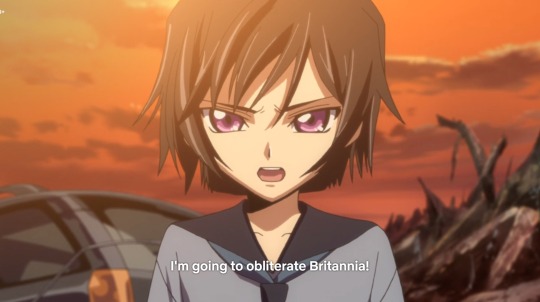
Reach your arm out and grab the stars or whatever that quote from LoGH is.
Based on this, I’d argue Lelouch is what one might call a flexible strategist. This doesn’t refer to his military tactics (although he seems pretty flexible with those as well) but simply means that, for better and for worse, he’s relatively sensitive to factors and people in his external environment. On one hand, he seems to flourish in environments where he gets support. During his childhood in the Imperial Palace, he seemed to mostly get along with and care about his siblings (as mentioned earlier). He was also by all accounts a very bright child - he did say he never managed to beat Schneizel at chess, but to give Lelouch some credit here, Schneizel at the time would have been an adult man in his early 20s, while Lelouch was, like, 7. The fact he even stood a chance is fairly impressive. I do not want to argue chess ability is the ultimate measurement of childhood functioning, but my point here is this: he seemed to be on a decent developmental path, both cognitively and socially, all things considered. On the other hand, he tends to react poorly whenever something goes wrong. I’ll talk about this in more depth in the emotional development section, but tl;dr: Lelouch is a very volatile character, who tends to have very high highs and low lows.
While Lelouch seems to be more “formable” by both positive and negative environmental influences, Nunnally is more of a so-called fixed strategist. She, like Lelouch, seemed to be in a decent place before the incident, had a period of acting out after her trauma (throwing tantrums etc.), but got “back on track” through Lelouch fairly quickly. She seems more forgiving of her family, for example when she is instantly supportive of Euphie’s special administrative zone (which Lelouch has a very ambivalent relationship with). Towards the endgame in S2, she even aligns herself with Schneizel. As her arc goes on, she shows herself more and more capable of functioning without Lelouch’s help, and make decisions of her own, based on her own opinions. Her outlook on the world seems to be much more down-to-earth and less black and white. Even when her own brother (the only person she’s been able to rely on for most of her life) geasses her and literally leaves her lying on the floor, she tries to reason with him. This is obviously just speculation, but I think had something similar happened to Lelouch he would have, psychologically speaking, completely lost it (in fact, he does lose it multiple times, which I’ll also get back to). Additionally, from the glimpse we see of Nunnally with Suzaku after Zero Requiem, it seems like she’s been able to cope relatively well with her brother’s death. In general, she seems to find her feet much easier than Lelouch and is more stable across situations.
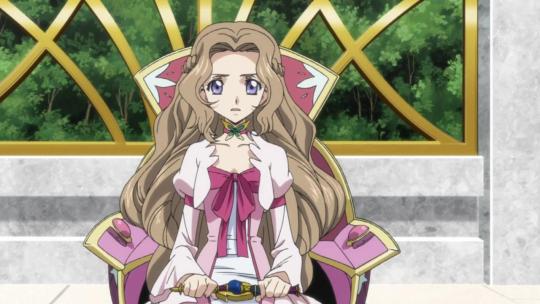
To summarise everything so far: I’d argue neither Charles nor Marianne were secure caregivers for Lelouch and Nunnally. This is implied not only by their traits and actions, but can be inferred from Lelouch’s maladaptive developmental path. The reason we see this pattern develop in Lelouch but not Nunnally is that he, through parentification, functioned as a buffer for her. Furthermore, this difference in trajectories is amplified by their different underlying susceptibilities - Lelouch more sensitive/formable by negative events and loss in general, while Nunnally is more resilient. From this point on I’ll focus mainly on Lelouch, and discuss how this magnificent cocktail of risk factors explain his developmental outcomes as an older teenager - in particular, how it shines through when it comes to his emotionality, identity, and goals/motivations.
VI. Thunder in Our Hearts: Emotional Development and Interpersonal Relationships
Lelouch frequently throughout the series, for lack of a better term, loses his absolute shit. For example, in the scene where he plays chess with Mao in S1 E16, he screams and dramatically falls backwards when the last piece is thrown onto the scale. He’s completely devoid of expression, and is well and truly out of it until Suzaku arrives. He ends up in a similar state of mind when he thinks Nunnally is killed in S2, where it seems like he’s completely detached from his surroundings - just repeating that he wants to speak with her. In addition to these dissociative-esque states in response to extreme stress, he has lesser breakdown and outbursts as well, such as: after Shirley’s father dies, after the incident with Euphie, when he’s flipping out at Rolo upon seeing his phone locket, etc. Additionally, he’s been shown to take stress and anger out on other people in the (kinda hilarious) scene where he goes to an abandoned street to use his Geass on random people, making them dance as he stands there being angsty. These bursts of emotion don’t exclusively concern negative situations either, as evidenced by his multiple periods of manic laughter and monologues during battle.
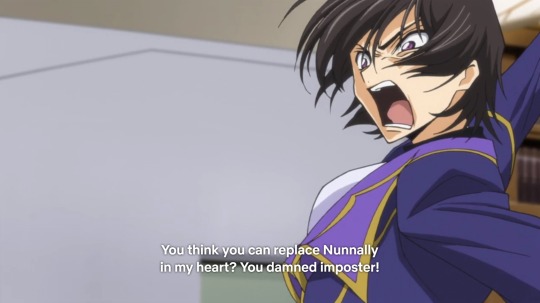
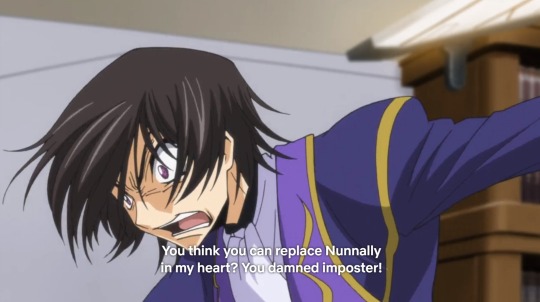
I once read this Geass analysis claiming Lelouch is an unemotional character. As evidenced by these screenshots, that was a correct take and not inaccurate at all. Emotions? Where?
In addition to being fairly emotional, Lelouch’s character is also very centered around the people in his life. His mother and sister are the primary motivation through the series. He uses Nunnally’s well-being to justify his actions. He let’s C.C. comfort him. He cares greatly about Shirley, and is devastated at her father’s death (though one can only assume he feels a bit better after punching a wall in the shower), to the point where he erases her memory to spare her the suffering he’s bringing by getting her involved. He obviously deeply cares about Suzaku (again - essay for another day), and orders him to keep on living no matter what, despite him being the number one obstacle for Zero’s plans. If he expresses this affection in a reasonable way is another question entirely - his main way of expressing his love for Nunnally seems to be killing thousands of people for her sake, Shirley by erasing her memory, and Suzaku by forcing him to live on at any cost, which is the exact opposite of what he wanted.
He also has a recurring pattern of requiring a lot of external emotional regulation through other people. Nunnally is the most obvious example of this (obviously) - whenever something goes slightly wrong, he usually defaults to screaming about her, and becomes absolutely devastated whenever she’s unsafe. If Lelouch functions as her buffer, I’d say she’s her crutch. He heavily leans on her for justification and a purpose in life. But, these maladaptive ways of leaning on people also occurs with other characters, such as in the scene with Kallen in the warehouse where he’s about to inject himself with refrain. Kallen takes the needle from him and throws it on the ground, and he reacts by walking towards her asking her to console him - saying “there are things a woman can do for that, right?”. Kallen promptly (rightfully) slaps him, and he seems to regain his senses.
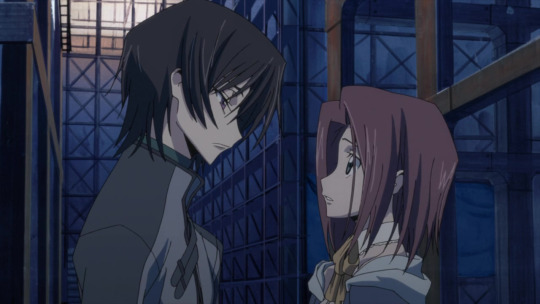
The most frequently repressed scene by all Lelouch fans.
In summary, I’d argue Lelouch is the complete opposite of an unemotional or uncaring character. He often seems to struggle with controlling his (plethora of) emotions in healthy ways, and copes with them either through completely shutting things out, having frequent breakdowns, lashing out on others, or using people as emotional crutches. He’s also very centered around other people, but tends to express it in less-than-appropriate ways, and goes on about things in an almost childish way, at times. This, I think, is indicative of his insecure attachment and lack of sensitive caregivers. In contrast to Nunnally, who had him, he didn’t have anyone to provide safety and externally regulate his emotions, meaning he was never able to internalise such strategies. Thus, there is a pattern of unhealthy (lack of) regulation of emotional states, leading to these stark contrasts between high and low points, and the quite bad ways he deals with them. Years of stress, repressed restlessness and unhealthy coping mechanisms for trauma certainly didn’t help either. Put simply - he’s a bit emotionally immature, and this is a significant aspect of his character.
VII. Reflektor: Identity and Projection
One of the most prevalent motifs in Lelouch’s arc, save for the chess symbolism, is the theme of masks and a fragmented identity. Throughout the series, he uses different identities to fill different roles in his life: Lelouch vi Britannia the prince, Lelouch Lamperouge the student, Zero the terrorist/freedom fighter and eventually Lelouch vi Britannia again, the tyrannical 99th Emperor of the Holy Britannian Empire. This switch is the most obvious display of the fragmented identity theme, as he is quite literally changing his name and masquerading as different people. With his Zero persona he even puts on a literal mask to conceal his face, but he also uses subtler, figurative masks for his other personas in order to achieve various goals. Additionally, there are also subtler role shifts at play within these identities: Lelouch Lamperouge exists as Nunnally’s caregiver, a student council member, Suzaku’s childhood friend, etc. (as with all people, fictional or not).
It is here his main ideological conflict with his parents arises. Charles and Marianne wants, through their Ragnarök plan, to abolish all “masks” and fuse mankind into one collective unconscious. Their reasoning is that if everyone were honest and there were no separation between people, the world would be a better place. Lelouch, however, finds the concept of identity masks useful and even defines himself by them. This is clearly shaped by his own experience - in order to survive in Area 11 and protect his sister, he had to change his name and lie. In order to gain real power and influence to overthrow Britannia, he had to change his name and lie. This modus operandi goes straight to the heart of his identity, because it is the reason he is able to exert his will over the world in any meaningful way - which, as we discussed earlier, is the reason he is “not dead any longer”. His core idea is that those who are privileged enough to be able to tell the truth about themselves, have no right to deny others the right to lie for their own survival or to achieve their goals.

Carl Jung arguably had a much more significant impact on anime than he did psychology. Actually, this isn’t even arguable.
Another, subtler way the series conveys the theme of fractured identity is Lelouch’s projection of desires and wishes onto others. This is shown quite literally through how the Geass gives him the power to command anyone to do anything. But not only does he impose his will onto others through verbal command, he also projects his more abstract goals and desires into the people in his life. Again, Nunnally is the most obvious example of this: Everything he does, he claims is for the sake of Nunnally. It’s interesting he never outright says that he wanted to do any of this for any personal reason - it’s all about a kinder world for Nunnally, Nunnally’s smile, and how their parents abandoned them. In the final confrontation with Charles and Marianne, Suzaku asks him if he used Nunnally as an excuse to justify his actions. Lelouch confirms this, and then says he fought to protect everything he wanted to protect. Still, he never mentions he feels rejected, or that he would want to grow older in a kinder world, even though it’s obviously more his own wish than hers (as Nunnally mentions during Zero Requiem, she would have been happy just being with her brother). In a way, he considers himself two steps removed from his desires - only working against Britannia on the basis of what he imagines the people in his life would want him to do.
Lelouch also has a tendency to view his own identity(-ies) through abstract symbols, rather than as a concrete human being with a backstory, grudges and motivations. In exile he expresses frustration at being a pawn of Britannia, as Zero he functions as a faceless symbol of Japanese liberation and a rebellion against the establishment, and as Emperor he aims to become a symbol of people’s hatred towards their oppressors. Even the orchestration of his life’s ending is primarily a symbolic act to him; with the world’s hatred focused on a tyrannical Emperor, the world can be peaceful when that symbol disappears. Lelouch seems very aware of this himself: that he is past the point of no return, and destined to become someone who will bear the burden of sacrificing his own identity, morals and character to play a part. He, in a way, seems more comfortable in this realm of abstraction - in being more of a symbol. However, if we try to strip away his rather grand narrative for a second, we’re left with a person committing suicide at 19 because he thinks the world will be a better place for it.
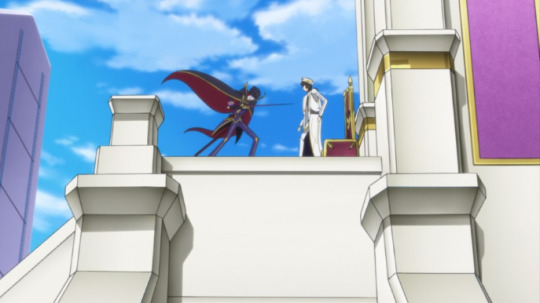
Black king captures e1, checkmate.
VIII. Pity the Child: Politics and Spite
Lastly, I want to make the argument that the parental abandonment Lelouch and Nunnally experienced, and the subsequent cascade of issues is the most important aspect of the series. Even more so than the central ideological conflict of working against versus within systems of oppression. As I’ve already touched on a fair bit, I think Lelouch’s circumstances growing up and the experiences arising from that was the very foundation for his later ideology and hatred for Britannia, rather than his ideology in and of itself being the reason he hates his parents and the system they represent. This is best represented by the climax of the scene with Charles and Marianne in C’s world, where Lelouch speaks not of systems of power, racism, oppression, politics, etc. - he speaks of abandonment and hurt.
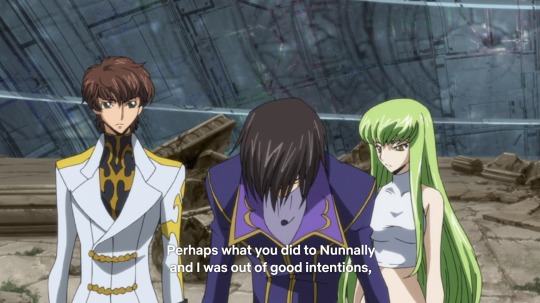
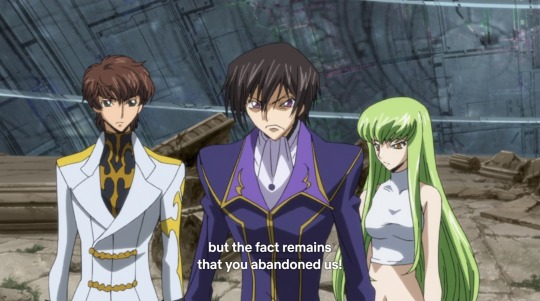
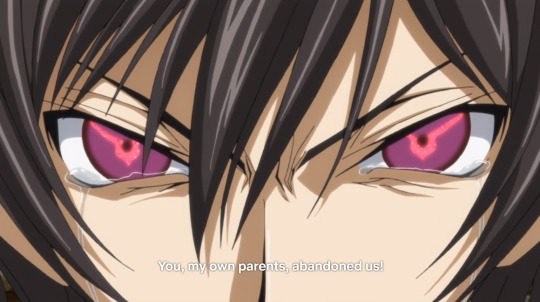
In my opinion, there’s reason to question whether he would have gone to the same lengths to destroy Britannia if he’d not been exiled from the system himself. In one of the picture dramas from his summer in Japan as a child, he lectures Suzaku on Britannian and Japanese foreign trade policy, making the argument they’re both unethical. This indicates he already knew of and disagreed with the actions of Britannia, but it’s only after he’s exiled and war is declared on Japan he begins talking about enacting revenge. Additionally, he has some truly magnificent displays of hypocrisy throughout the series that (in my unpopular (?) opinion) puts Suzaku to shame. Even the very act of him using Geass is contradictory to his fundamental belief: that opposing a well-intentioned act upon others is no different from an evil act. During their confrontation, he is very concerned with expressing this ideology to his parents, before promptly turning around and making his brother a geassed slave forever, two episodes later.
Not to completely undermine his ideological streak; I do genuinely believe he is anti-Britannia, and I do genuinely believe he values personal freedom highly. However, based on everything discussed so far, I’d argue he would perhaps not have cared as much, or at least been more open to a more Suzaku-esque approach, had he not had deep personal trauma connected to the whole situation as well. So, his main motivation isn’t to “bash the fash”, as it were, but rather bash these few specific fash who traumatised him and his sister before shipping them off to a foreign country they then immediately declared war on. Revenge, spite, and pure, childish anger towards a family that wronged him is a much more useful lens through which to view the series, rather than an ideological conflict per se.
IX. The Conclusion Bit, Finally
To summarise this entirely too long essay, Lelouch and Nunnally both suffered from insecure attachment and later trauma and parental abandonment. Nunnally’s main protective factor/buffer for this trauma was Lelouch, which gets her “back on track” towards becoming an emotionally stable and independent girl. Her brother, however, doesn’t have anyone to fill this role, and this cascades into dysfunctional behaviour and strategies across different domains: his trust issues as a child, obsession with revenge, immature emotionality, poor handling of stress, projecting onto others, and a fragmented concept of his own identity. Lastly, I think these personal issues constitute the crux of his motivation throughout the series - Lelouch’s arc is about trauma, parental neglect and spite more than it ever was about politics.
#code geass#lelouch vi britannia#lelouch lamperouge#nunnally vi britannia#@ everyone who's ever wanted to read a Long essay on code geass and developmental psychology: you're welcome#I hope some of it is understandable or even interesting#my essays#.........that's a VERY optimistic tag but I feel like I have to tag it with Something#analysis
228 notes
·
View notes
Text
Repost from facebook, in case anyone cares about Canadian sports TV
I usually try to take one or two days to think about a hot-button issue and avoid making kneejerk emotional reaction statements in response to it, so a little late to the party: Don Cherry, eh?
There's a lot to talk about here. I'm not going to tell you whether or not he deserved to get fired, because frankly I don't work for Sportsnet or have any first-hand exposure to anything he may have said in the past that led up to this decision. I can't tell you if it was this comment in particular that sent his employers from 0 to 100, or if it was just the latest in a series of flack-catching events that they're tired of doing damage control. I don't particularly care either way, that matter is between him and his former employer. I will tell you, however, that the Government of Canada was not involved in this decision, and his firing was not a violation of his (albeit limited by Canadian laws) freedom of expression, as a television network is well within their rights to dismiss a representative who is delivering content to viewers that is incongruous with what the network wants delivered on their behalf. Moving on.
I have seen some people argue that Cherry was addressing everyone in Canada, and not only immigrants, so since apparently some short-term memories are not so great, I took the liberty of transcribing his comments:
"...Downtown Toronto, forget it! Downtown Toronto, no poppy... How bout [running?] it for the people that buy them? Now you go to the small cities, and you know... you know, those p--... the [rows and rows?] ... You people love, you that you come here, whatever it is, you love our way of life, you love our milk and honey, at least you could pay a couple of bucks for poppies or something like that. These guys pay for your way of life that you enjoy in canada, these guys paid the biggest price..."
So, if you only heard every word past "you love our way of life", then I could understand the opinion that he was addressing all Canadians. But that isn't what he said, he used the words "you people ... you come here". Where is "here"? There were three places listed in this rant:
-small cities
-downtown Toronto
-Canada
He's clearly not talking about small cities, since he implies that poppies are everywhere in small cities.
Is he talking about downtown Toronto or Canada? In that case, who "comes here"? It's not Canadian citizens from downtown Toronto (since they did not "come to" a place they were already living), it's not Canadian citizens from outside downtown Toronto (since as mentioned, those people tend to wear poppies proudly in large numbers), so who's left? You already know the answer, it's immigrants.
So, some of you may now be wondering, "so what, what's wrong with that? Should people who move here not be expected to respect our military?" I would say, sure, if moving to another country means adopting some of their ways of life, and you believe patriotism in support of donating to the Legion falls under that, you could make that argument. But why single out immigrants to Canada, when just a few seconds ago people agreeing with him were entirely convinced he was addressing all Canadians? What purpose does it serve to single out immigrants?
Furthermore: why are we pointing fingers at new arrivals to Canada to blame for a decline in poppy sales? Full disclosure: I did not buy a poppy this year. That wasn't on purpose. The part of town I work in has been plagued with construction reducing major arterials to a single lane, so lately I've been resorting to "creative" suburban bus routes to get home.
Did you know that the Legion maintains a list (https://legion.ca/remembrance/the-poppy-campaign) of places where you can get a poppy? I didn't, and I also have not been passing by the listed businesses on my way home lately. It didn't enter my mind, as pretty much the only way I really remember what time of year it is on a day-to-day basis is "is my rent due today?" and "is there snow on the ground?" and I did not enter any of these businesses for any reason as of late, and just forgot to get one. There are countless other adults like me -- what changed over the years?
Compare Remembrance Day to other national days of importance like New Year's. Everyone knows when New Year's is coming up, because its presence is ubiquitous. Everyone talks about their plans, their resolutions, their parties. Remembrance Day is much less culturally ubiquitous in the days before it, meaning there are less frequent "oh yeah, I should do something" reminders entering your field of vision. 15-20 years ago, I would see commercials on TV frequently, and that was a good reminder. Today, I don't subscribe to any cable or streaming services, and I browse the internet with an ad blocker. A lowered frequency of passive reminders is a real factor in your day-to-day decision-making, and perhaps there's room for people much more knowledgeable about marketing than I am to discuss targeting demographics who weaned off TV in the information age. That's not for me to propose any solutions to, just pointing out a cultural source of decline that isn't pre-existing bias against immigrants.
Going back to the immigrants point -- not only is it creating a scapegoat, but it's also just plain wrong. "World War I" and "World War II" are aptly named, check out this table: https://en.m.wikipedia.org/wiki/World_War_II_casualties#Human_losses_by_country
World War II killed military members from literally all over the world. Indonesia, Brazil, Iraq, Ethiopia, China, India, Thailand, just to name a couple. Countries like Mexico who suffered no military losses also suffered civilian losses. World War II ended over 70 years ago, but generationally, 70 years is not a long time. Children growing up without their parents and siblings lost to war, they have to live with that forever. Survivors living with PTSD, that is a condition that affects your entire life and those around you. Economically, that much loss in life and prosperity affects the entire world, and always hits the poorest the hardest. The effects of war on a person and their family last for generations, and this is true around the world. People immigrating to Canada, statistically, are probably already well acquainted with this fact first-hand. They do not need to be lectured on the importance of military service any more than a born Canadian citizen does, chances are they already know.
World War II also ended, like I said, a very long time ago, but as we are all already aware, it certainly wasn't the last military effort Canada participated in. While we honour the sacrifices made by veterans in wartime, the CAF and the Legion still need funding for things like supporting veterans living with PTSD (https://www.legion.ca/support-for-veterans/mental-health-ptsd), such as services like the Family Information Line (https://www.cafconnection.ca/National/Stay-Connected/Family-Information-Line/Connect-With-Us.aspx). If you didn't know those services existed, what separates you from a new immigrant who also didn't know about them?
There is a separate discussion to be had by people much more knowledgeable than me about the morality of the CAF intervening in some foreign regions or being involved with cracking down on illegal marijuana, but that's a discussion I won't open up here and am not confident in discussing. However, some of the existing services offered to veterans that are funded in part by poppy sales are what I would consider altruistic and good to know about no matter how long you've lived in Canada, especially if you know somebody who served in wartime.
So how does all of this relate to Don Cherry? Ultimately, it's disappointing that he chose to single out immigrants in this way, when immigrants have no less understanding than born Canadian citizens about what exactly wartime sacrifice means. Interestingly, I was browsing some discussions about this yesterday, and came across some comments from people who do not understand a word of Punjabi, but enjoy watching the Punjabi broadcasting of Hockey Night In Canada because of the genuine unbridled enthusiasm of the commentators for the game. A broadcast program like that exists to do an example of exactly what Cherry and his supporters are critical of "immigrants" for supposedly -not- doing, and that's integrating with and participating in Canadian culture. There is no widespread attitude from new arrivals to Canada to reject Canadian values and culture. Nobody goes to a new country with the intention of having nothing to do with the country around them, that's a miserable way to live and is not something anyone wants to do by choice.* Look at Sweden, the vast majority of people learning Swedish on Duolingo are refugees living in Sweden. His comments were unfairly targeting certain Canadians in a way that singles them out as "others", and that's really unfair for them to have to hear coming from someone who is a Canadian cultural icon commentating a game that countless people from all walks of life, from any part of the world, take great joy in watching as part of being in Canada. All he had to do was apologize, and he didn't, and that's really unfortunate and has made a lot of Canadians who grew up with him as a household name very sad.
* (This is not even getting into the unspeakably horrific sacrifices imposed on our Indigenous populations, which make the whole judgmental comments about "immigrants" an entirely different and gross flavour of ironic.)
It's even worse that it comes at a time of heightened political "us vs them" tensions. We don't need more of that. The line between left and right is getting wider and wider every day. You can even see a visual representation of this courtesy of our neighbours to the South in this video: https://youtu.be/tEczkhfLwqM -- not that you need to, really, just look at our election 3 weeks ago where suddenly a bunch of provinces threatened to leave the country because they didn't get their way. (Speaking of, the election was three weeks ago, holy. Your negative comments about immigrants in the wake of Don Cherry's firing contrasted with your faux-concern about Trudeau's racist makeup has been duly noted. Maybe note that Trudeau's damnable actions happened 20 years ago, aka what some of you consider to be "the good old days" when people were "not so easily offended", as in, a time when Cherry likely would not have been fired for his comments, like Trudeau wasn't fired for his racist makeup. Think about that for a second before sharing that nonsense meme.)
Cherry's words and a refusal to think outside the box or apologize to Canadians just trying to live in Canada and enjoy a hockey game were ultimately promoting political tensions that don't need any further promotion, and that's unfortunate. Ultimately, whether you were born in Canada or not, both you and your neighbours just want to provide the best life you can for yourselves and your loved ones, and some of you actively chose Canada as the best option to achieve that goal in. And that's a pretty special thing to reflect on and unite over in the face of tension and division.
15 notes
·
View notes
Text
I do love you
A new Roger Taylor series that I had an idea for which I hope you all will like.
Taglist: @marshmallowmae @langdonzvoid @mcrmarvelloki @butlegendsneverdie @jennyggggrrr @reedusteinrambles
Roger Taylor masterlist
Series masterlist
Enjoy.
~~~~~~~~~~~~~~~~~~~~~~~~~~~
"Where is he?" (Y/n) couldn't find it in herself to care about the tone she was using with the person stood in front of her who she classed as a very close friend. Nor could she care that he could clearly see the tears that were falling from her eyes.
She knew this was the first time she had seen him and two of the other three band members in just over three months, also meaning that this was the first time that they would have seen her with her growing baby bump. Having not told her friends about this rather important part of her life, knowing the reaction she would gain if she spilled the details to them.
Brian didn't have to ask who (Y/n) was referring to, it was very clear to him that she was wondering about the drummer. The one member of the band who knew her better than anyone else in the world, the member of the band who went to her for anything and everything because she knew him inside out. Trying not to let his jaw hang open Brian pointed behind him to the room which held the other three band members, the drummer sitting behind his drum kit at the very back of the room behind Brian.
Nodding her head (Y/n) bypassed Brian, moving to go and stand in the doorway to the room, arms folded over her chest as she waited for the drummer to realise that she was there. Watching the smile pulling at his lips as soon as his eyes flitted onto her frame. His bustling energy causing him to jump to his feet, idly walking down from the drum risers to trot over to where she was. The smile falling from his lips when he took in her expression, noticing the slight redness around her eyes that wasn't visible from a distance, a sign that showed him she had been crying. Roger could never stand it when she cried for any reason. He also noticed that she was blinking a little too quickly like she couldn't focus her vision on him properly.
Not one word left the drummer's lips when he rested his hand on her arm for her to pull away from him, turning on her heels knowing he would follow so they could talk in private.
"Hey, slow down. What's wrong?" Catching her arm when they were in the lounge Roger tried to turn her so she was facing him. Hurt displaying on his face when she ripped her arm from his hand, such an expression on her face that he had never seen her have towards him before.
"You. You're what's wrong Rog, as always."
"Care to elaborate?" He snapped back, sass in his words as his hands planted themselves on his hips which jutted out to one side. His anger rising as he wondered what she was talking about, unsure of what he had done to upset her. An obvious thing coming to mind but they had already argued and tried to resolve that so there was no reason for her to blow up at him like this now.
"I don't give a shit that you mess with my feelings, that seems to be a given when it comes to you. But you can't fuck around like this and make me look like some kind of fool or some hooker, you got that?" Reaching out (Y/n) poked her index finger harshly into his chest, tears welling in her burning eyes as she tried to convey her message to Roger without breaking down. They had been friends for over a decade, they relied on one another and (Y/n) didn't want that to change even though she knew it was going to. She knew Roger inside out, and he tended to give mixed messages and sometimes that messed emotions for himself and others. She would let him mess with her emotions because she loved him and that was what happened when you got involved with Roger. But she wouldn't have him try to make a fool out of her or even unintentionally making her seem like a fool.
"I don't know what the fuck you're talking about! Why would I ever try and do that to you? You mean everything to me I wouldn't do anything to jeopardise that-"
"Except get me pregnant, right?" The corner of (Y/n)'s lips twitched upwards into a smirk that made Roger grow angry as he grabbed her hand, throwing it away from his chest. She couldn't blame everything on him even if it felt or seemed right. The pair of them had been under the influence of alcohol that night and both of them had wanted that, she couldn't act like it was all Roger's doing.
Roger wasn't lying, their friendship and just (Y/n) in general meant the world to Roger, he wouldn't have anyone talking about her in a bad manner so why would he do anything to portray her in that way? She wasn't some hooker to him and no one should ever see her in that way because it wasn't true, she was Roger's closest friend who he loved more than anything. He simply seemed to fall in love with her at the wrong time. After he was married to be more specific.
"It takes two to tango, or have you forgotten that you asked me to fuck you that night?" Roger sneered, raising a brow at her just begging her to retaliate against him on this one. He wasn't saying what they did was morally right, but it had been what they both wanted. He watched in silence as (Y/n) stayed quiet, their gazes interlocking as they egged the other on to say something that the other could retaliate to. Worry suddenly sparking to life in Roger when her hand moved to her temple, eyes snapping shut for a moment too long as her headache started to get worse.
Sighing Roger gently held onto (Y/n)'s arms, guiding her a few feet back so they could both sit down on the sofa behind her. He didn't want her to get upset or feel ill because they were fighting he would never want that.
"Right, so you haven't forgotten that, good. Let's just calm down and you can tell me what I'm supposed to have done to make you look like a fool." Rubbing his hand up and down her arm Roger waited silently, watching as she seemed to feel a bit better after a few moments making his heart slow down in its rapid pace.
"I bumped into your wife earlier Rog, and she tells me you're planning to have another kid. I know she's your wife and I don't have a say in your marriage which is perfectly fine but you can't get me pregnant and then act like it's not even happened. I'm not thick, you're not leaving her for me and I'm not asking you to but I feel like a bloody reject around you. You tried me out and dumped me to go back to her and that isn't fair."
(Y/n) wasn't living under the influence that any day now Roger was going to go home to his wife and tell her it was all over. She knew the drummer wasn't leaving his stability for a life with her no matter how long they had known each other or what they felt for one another. Nor was she asking him to leave his wife for her, that was never her call and it didn't feel her place to ask that of him. She could handle knowing Roger was most likely not going to tell anyone but the band her child was his, she was trying to come to terms with that. But she wasn't having Roger get her pregnant and then go home to his wife to have another child with her when their baby wasn't even born yet. It made her look and feel like she was one of his hookers that he dumped after one night. He had tried her and didn't like her or that he was going to cut her and the baby out of his life forever and keep to his family that wouldn't be looked down upon.
A perfect little family that she wasn't apart of.
"Hold on just a minute. I said no to kids because I'm not careless and I'm not a fucking idiot (Y/n), whatever she told you was what she wanted, not me. I have Rosie and I have our baby, alright? I want our baby growing up knowing I'm their dad and I don't care what anyone else thinks. I'm here for the long run, I'm not leaving you to do this alone and I'm not trying to replace our baby or make you seem like a one night stand. Contray to what you seem to think I do love you."
Roger wasn't trying to replace their child by having another with his wife, he wasn't that heartless or warped to think that would be the best way forward. He wanted to have this baby with (Y/n), he wasn't going to leave her on her own to deal with this because it was his child too and his responsibility.
"So how is this going to work?" If Roger was sure that he wanted to be involved it posed problems. He would need to tell his wife what had happened and sort that out before anything else, and then they would need to sort out how this was going to continue. Did Roger want to be with (Y/n)? Did he just want to be support to her and the baby? They had so many things to sort out and the more (Y/n) thought about it the more her head started to hurt.
"I don't know but right now sweetheart I don't particularly care about that. I care about you because you're not well. Do you need my glasses or something?"
Roger couldn't start thinking and talking about what was going to happen between them when (Y/n) clearly wasn't well. The headache she had clearly wasn't disappearing and her eyes were still playing her up. She was rubbing at her eyes which was going to make them even worse and sore and she looked like she couldn't see properly. As if her vision was blurring and she was trying to sort it out. Roger couldn't ignore the fact something was clearly wrong with her.
"My eyes are playing up. It's like... spots, starting to flare up in front of my eyes." Rubbing at her eye with the base of her palm (Y/n) brushed at her temple with her fingertips, trying to rid her eye problems and her headache at the same time.
A sudden feeling of breathlessness overtook Roger as he felt his foot beginning to tap rapidly against the floor. This was not a good sign, far from it and Roger needed to get (Y/n) to the hospital because if this was what he thought it was then it was serious. Gently resting his hands either side of her face Roger turned her head so she was looking at him, peering at her eyes as if he would be able to see what she was seeing. Watching as her eyes were constricted like he was shining a light directly into her pupils. The way she was blinking and squinting showing she was finding it hard to see properly and indicating her headache was worse than before.
"Are the spots kind of like flashing lights? White, blinking lights dotted around your eyes?" Roger questioned, watching the bewildered yet confused look appear on (Y/n)'s face as she wondered how Roger knew exactly what she was seeing.
"Y-yeah..."
There was clear hesitation in (Y/n)'s frail voice as she wondered what was happening. Watching Roger gently let go of her face to move and take hold of her hand that was pressing to her head. Examining her wrist and hand before doing the same to her other hand. Kissing the back of her hand to try and calm her down before he moved and knelt down on the floor, shocking (Y/n) when he took hold of her foot. Pushing up the trim of her trouser leg to see her ankle and then her other ankle. Seemingly finding what he was looking for from the way his face fell.
"Rog what are you doing... what's wrong?" Tears welled in (Y/n)'s eyes and started to roll down her cheeks as she watched Roger do some kind of mental assessment of her.
"You said you had a headache too, right? How long has this been happening for?" The urgency in his tone made (Y/n) bite down on her lip to stop a sob passing through her lips. Her eyes following him when he pushed himself from his knees to sit back beside her, taking her hands in his rubbing his thumbs over the back of her hands. His attempts at calming her down doing very little when he knew he couldn't hide the panic in his eyes.
"Few hours, no more than a day. Rog please... i-is it the baby?"
"Yes. I'm taking you to the hospital, I think you have something called pre-eclampsia- you might not, but I think you do. If it is that and you don't get treated the baby will develop complications." Roger couldn't lie, he could never lie to (Y/n) about anything. Telling her that this wasn't that serious and he just wanted her to be checked over would be lying. He needed to take her to the hospital to make sure if this was what he thought it would be treated and to see if it was at a serious stage or not. Roger was both hoping and thinking that it wasn't that serious yet.
Letting go of one of her hands Roger gently brushed his hand over her cheek, rubbing away the tears as he tried to dull down his panic and take charge. He needed to be calm and strong to help (Y/n).
"Sweetheart, listen to me. I'm taking you to the hospital now, you're gonna be fine because I'm gonna take care of you. I won't let anything happen to you or our baby." Leaning forward Roger brushed his lips against her own before getting to his feet. Gently wrapping his arms around her waist to help pull her to her feet, his hand moving to cradle the back of her head when her head fell to his shoulder. "I'll take care of you." He whispered again, needing her to know that he meant it.
107 notes
·
View notes
Note
Hi how do I become a male witch for real to support to women I love who is a witch and because I'm honestly curious and interested in being a male witch
✧・゚:* Sᴏ ʏᴏᴜ ᴡᴀɴᴛ ᴛᴏ ᴘʀᴀᴄᴛɪᴄᴇ ᴛʜᴇ ᴄʀᴀғᴛ ᴀɴᴅ ʟᴇᴀʀɴ sᴏᴍᴇ ᴍᴀɢɪᴄᴋ ᴀs ᴀ ᴍᴀʟᴇ ᴡɪᴛᴄʜ! *:・゚✧
Merry Meet!
☆ Thank you for being my first ask!
First I would like to begin with the fact that being a witch means something different to everyone.
” Witch for me is my most powerful self. Deeply grounded. Always healing and protecting myself and those I love. Bending attraction into my direction. Spreading peace and love wherever I go. Respecting nature. Following my intuition. Calling on my guides. Working with my inner wolf. Connecting with myself on all levels. Increasing my vibration. Meditation. Gratitude. Love. Light. This is what witch means to me. ” -Lunas Grimoire
" I think that magic plays a part in my day-to-day effort to visualize goals, deal with problems, and connect myself to nature. Spells and visualization are all about intentionality and channeling your life force!" -HS
“To put it simply, witchcraft is the practice of magick. This isn't to be confused with magic, which is what magicians do. Magick is a series of techniques a witch uses to harness energy (both external and internal) in order to change one's surroundings as well as one's self. It's also important to note that being a witch is not the same thing as being Wiccan. Unlike witchcraft, Wicca is a religion. However, it is common to meet witches who are Wiccan and vice versa. And most importantly, anyone can become a witch. Witchcraft is truly for everyone.” -The Witch Mommy
☆ So what is a witch?!
”First, many people do still use “witch” to mean “someone who worships the Devil and/or evil and who engages in gratuitous malevolence.” Present-day Witches generally feel that such a definition of “witch” results merely from Christian politics and propaganda. True, there are now “Satanic” churches, the most prominent having been Anton LeVay’s Church of Satan and the Temple of Set, and its members do call themselves “witches,” which certainly confuses outsiders. However, as J. Gordon Melton has pointed out, the members of these churches are actually atheistic, hedonistic, and egoistic in their ethics. Pagan Witches regard Satanist witches as Christian heretics and not Pagan at all. Setting all that aside, we can look at the more positive usages of the term.First, “witch” is often used to mean “someone who practices some form of magic.” But “folk magic” is ubiquitous, and those who practice it usually consider themselves to be devout members of the faith community around them, just with a special gift. They very rarely seem to think that their magical practice constitutes a unique religion. Nevertheless, there are quite a few such “magical witches,” and they logically must be considered part of the Craft movement.Second, “witch” is often used to mean “someone who has and uses unusual psychic talents.” It can thus be applied to Spiritualist mediums, to clairvoyant readers, to diviners, and so on. Again, such people almost always consider them to be members of the surrounding faith community, just with a special talent, and likewise do not regard that talent as constituting a different religion.Third, “witch” is now (and only recently) used to mean “someone who honors or worships the Old Gods” of whatever pantheon, though “Pagan” is also used with this meaning. Here the self-concept is that one is pursuing a religious path different from that of the surrounding community, but such pursuit does not necessarily involve any use of magic or psychic talents.It is only within the Pagan movement as inspired by Gardnerian Witchcraft that these three different meanings have been bundled together into the current concept of the Pagan Witch as practicing a unique and magical religion.At first, before the rise of the festival movement in America about 1980, a fourth meaning of “Witch” was included in this bundle: “someone who has been initiated as a member of an organized group (yes, a coven) that practices Witchcraft as a Pagan religion or as an apprentice of a master teacher of witchcraft.” Once the festivals had evolved to provide people with a way to celebrate the Wheel of the Year, and once enough “how to” books had been published to give people all the information they needed to practice the Craft as a solitary or only within their own families, joining a coven was no longer the only way to follow Wicca or a more generic form of Witchcraft as a spiritual path.There had been some solitaries even in the 1960s and 1970s, but as a result of the festivals, around 1980 the movement divided into two categories, one being a laity, who now constitute at least 90 percent of all Witches in America, the other being those who have been initiated into and practice the Craft within a coven or equivalent group. However, a First-Degree initiate of a coven is not regarded as having any special authority or expertise, given that anyone can learn from the published books about 99 percent of what that initiate would know. Instead, there is another level of meaning.” -Aidan Kelly
Before you get started you must understand, there are many different paths or well types of witchcraft.
☆ The most common types usually include:
1: GARDNERIAN WITCH: A Gardnerian Witch is someone who follows the belief system of Gardnerian Wicca, which was created by Gerald Garner in the 1950s. Gardnerian Wicca is hierarchical system that consists of a high priest and priestess as well as various initiations. So, one is not a Gardnerian Witch until they have learned their specific traditions and have gone through proper initiation.
2: ALEXANDRIAN WITCH: Alexandrian Witchcraft is like Guardian Wicca in that it is a formalized belief system which contains it’s own traditions and initiations. Alexandrian witches follow some of the similar traditions in Guardian Wicca, but also incorporate ceremonial magic as well as the Qabalah.
3. SOLITARY WITCH: A solitary witch is someone who performs spellwork and rituals alone and without a coven. This may be by choice, or perhaps they just haven’t yet found a group of fellow witches they would like to work with. A solitary witch can incorporate various different paths based on their interest and may or may not use witchcraft as part of a wider spiritual path or religion.
4. ECLECTIC WITCH: An Eclectic witch is someone who pulls from various witchcraft traditions for their spellwork and rituals. They rely on a variety of different cultures, beliefs, and systems to formulate their own personal witchcraft practice which may change and evolve over time.
5. TRADITIONAL WITCH: A traditional witch is someone who takes a historical approach to witchcraft. They look at old grimoires, witch trials, various witch lore, and historical accounts to lay the foundation for their own spells and rituals. Often traditional witches focus on working with the nature and history of the place they live and may work with the genius loci, or the local spirits.
6. HEREDITARY WITCH: A Hereditary witch is someone who was born into a family that practices witchcraft. Usually their knowledge is passed down through generations and each family may have their own traditions and belief system. Though, just because someone is born in a witch family it does not necessarily mean that they will be more knowledgeable or powerful than a non-hereditary witch.
7. HEDGE WITCH: A Hedge witch works with the liminal spaces and the spirit realm. In the past a ‘hedge’ would mark a boundary of a village or settlement and thus represents the boundary between our physical reality and the spirit world. A hedge witch may be skilled at crossing that boundary through practices like astral travel.
8. KITCHEN WITCH: A kitchen witch enjoys making their home and surroundings a sacred space. They often like to incorporate witchcraft with their cooking and put their energy and focus into to the food and the meals they create. They care deeply about the ingredients, and may have their own herb and vegetable garden.
9. GREEN WITCH: Green witches are extremely nature based. They are likely to be in-tune with the seasons and often use natural materials to create their own magical tools. They most likely try to perform all their spellwork and rituals outside in nature when possible.
10. COSMIC WITCH: A cosmic witch incorporates astrology and astronomy into their witchcraft. They most likely closely follow the alignment of the planets and they will often will coordinate their spells and rituals based on the location of the planets and the moon.
☆ Labels.. Labels.. and more labels!
Also, here are a few labels that are commonly passed around as well!
It’s very important to remember that labels should never limit your practice. These are just classifications that I find useful in describing myself, and others have used to describe themselves. This list was made purely for fun. This is, by no means, a complete list. You do not have to ‘fit’ into any of these. A person’s craft is unique to them, that’s what makes it so awesome. (Warning: you may see some repeats from the previous list!)
Omni Witch: A bookworm and a know it all, this type of witch studies and practices all the fields of magick. They are innately curious about everything, and love to learn. They are talkative and eager to share the massive amount of knowledge they have absorbed.
Eclectic Witch: The Boho witch. She uses a combination or mix of whatever paths suit her best. Typically specializes in 2-4 different sects of the craft. She often will wear a mix-match of clothing, but enjoys long flowing things. She tends to be very random and eccentric, but is friendly nonetheless.
Kitchen Witch: This type of witch uses easily obtained items and weaves magick into every aspect of their life. They are particularly fond of cooking, arts and crafts, sewing, cleaning, gardening and baking. They are skilled in potions, herbology, and subtle magick.
Cottage Witch: A Witch who focuses on hearth magick. Much like the Kitchen witch, but with less emphasis on the cooking. They are the homemakers, the ones who decorate the house for the holidays. Usually empaths who are very sensitive to the people around them.
Practical Witch: A branch of kitchen witch, they are adept at spellwork, and use their magick for everyday, mundane things. They adore the use of sigils and put them everywhere. Very down to earth individuals, who enjoy experimenting with ways to use magick to may their daily life easier and more enjoyable.
Stitch Witch: A brand of Kitchen and Cottage witchery that holds magickal fabric work in high regard. They focus primarily on knot and stitch magick. Very scatter-brained individuals. Their room are always in disarray, fabric and thread everywhere. Usually fond of cosplay. LOVE making Halloween costumes for their family and friends.
Green Witch: The woodland witches, these earthy individuals protect plants and love to garden. They usually are adept at spirit communication, hearing and responding to the needs of their many leaf-bearing friends. They thrive in natural environments such as forests, lakes, rivers and gardens. Green witches enjoy sunlight, growing plants and collecting rocks. They focus on holistic medicine and are learned healers. They are very familiar with their local region, having memorized all the species of plants, trees, insects, wildlife and flowers. They truly love the earth.
Crystal Witch: A branch of Green witchery, these witches primarily work with stones, gems, crystals, and rocks. They LOVE geology, spend a lot of time hiking and collecting crystals. Usually very organized individuals that are in tune with the earth. They always know when the next local rock and mineral show is. Usually broke because they are always buying new rocks. So many rocks. Fucking rocks everywhere omg.
Creature Witch: Another branch of Green witchery, mixed with spirit working and hedgecraft, these witches primarily work with Magickal and Astral creatures and spirits. They are very friendly people, and get along with all kinds of physical, and not so physical creatures. They collect fossils and bones and skulls and know the names and personalities of each spirit attached to them.Hedge Witch: A witch that lives between two worlds. They easily cross over into Elsewhere, the astral realm, and do so with ease. Often skilled at working with magickal creatures and familiars, they are very creative and artistic individuals. They are also very adept at psychometry, spirit communication, energy work, and time travel. Also called Astral Witches.
Energy Witch: Witches that perform all of their magic internally. Their magic is one of pure energy, using circles cast in their heads and their imaginations to bring their will to life. Are usually shy and keep to themselves. They enjoy divination and astral projection. Also called Intrinsic Witches.
Shadow Worker: A combination of energy and hedge magick, the shadow worker tames and summons Shadows of their own past and personality. They regret nothing, are very in tune with their emotions, and spend a lot of time meditating. They are not afraid to confront their mistakes, because accepting the flawed pieces of their personality gives them power.
Spirit Worker: A Witch who communes with the dead spirits of humans, animals, and others entities. Some can even communicate with the spirits of trees, rocks, and man-made items. They are usually very outspoken, opinionated people. They use spirit boards and pendulums, among many other tools. They enjoy taking strolls in graveyards and having casual chats with the dead. Also called Mediums.
Exorcist: A branch of Spirit Worker. They are usually hereditary, clairvoyant and raised into their practice. They learn their craft as it is passed down from their family members. They practice the archaic tradition of exorcism, aka banishment of dark or foul entities. Very somber individuals, who try their best to be optimistic.
Oracle/Diviner: Branch of Spirit worker. Witches who primarily focus their practice on divination. Tarot, runes, pendulums, spirit boards, scrying, crystal gazing, aeromancy, stichomancy, sea gazing, animal gazing, bird watching, lynchomancy, ceromancy, astrology, numerology, amathomancy, dream interpretation, shufflemancy, tea leaf reading, people watching, palm reading, face reading. You name it, they probably know how to do it. Usually clairvoyant and have a number of other psychic abilities.
Chaos Witch: A witch who uses baneful magick in their craft. They enjoy working with bones and are skilled at channeling and communicating with spirits. They will sometimes use demons, storm magick, blood magick, and cursing in their practice. They fear nothing. Commonly mislabeled ‘black’ or ‘dark’ witch. Which is not correct. Tsk tsk.
Necromancer: A branch of Chaos magick, these witches take spirit working a step further, and are adept at communicating and controlling the dead. Necromancers usually have a familiar ‘wraith’ that acts much like an astral or spirit guide. Some can even raise the dead for a period of time to converse with them.
Blood Witch: Another branch of Chaos magick, these witches primarily use blood in their rituals. They have a high pain tolerance, care little about what others think or say, and are very set in their ways. Some do it to prove how strong they are or devotion to their deities. Nonetheless, nice people once you get to know them. Perhaps a bit misunderstood.
Sun Witch: A witch who draws their power more from the sun, than the moon as most witches tend to do. Adept at fire magic and are usually very spirited individuals. They use candles often in their practice, and love to throw barbecues and bonfires with their many friends. They enjoy sunbathing. Their magick comes in giant bursts and they will often use a lot of energy at once.
Lunar Witch: A witch who primarily draws their power from the moon. They adore her and are usually adept at making moon water and knowing exactly what phase of the moon it is at any given time. They do not fear the dark, do much of their magick after the sun goes down, and have the ability to speak with the Lady Luna herself. These witches also may choose (or be chosen by) one of the moons of another planet, such as Miranda or Europa., and will work with that particular celestial body.
Star Witch: Not to be confused with a Space witch, who works with all of the cosmos, primarily aliens and astrology. Star witches draw their power from constellations, stars, and the sun. They love star gazing, have star charts hanging on the walls of their room, and never miss a meteor shower. Very chipper individuals who always want to go to the planetarium rather than out to see a movie or to the park. They may also work with planets as well as stars.
Storm Witch: This breed of witch is both terrifying and thrilling. They have a great sense of humor, and are usually very cryptic. They give zero fucks what people think of them and march to the beat of their own drum. They whistle up the winds and summon lightning. These witches are usually very adept at cursing and fear nothing. They like horror movies, cloudy weather, and casting emotionally charged spells. They are empathic individuals and always feel things to the extreme, there is no middle ground with them. Its black or white.
Winter Witch: Witches who reside in the colder climates of the world. They cast snowstorms, collect hail and make poppets from snow. Blizzards are their best friends. They love cold weather, and usually draw their power from the snow and clouds, rather than the sun or the moon, as neither are usually very visible during storms. Despite their chilly disposition, they are warm and friendly once you get to know them.
Sea Witch: These witches hone their craft near a body of water, and center their practice around it. Some sea witches will work with fresh water, such as rivers or lakes (in which case they will usually call themselves ‘river’ or ‘lake’ witches), some with the ocean. Sea witches without immediate access to a body of water are called ‘land-locked’. They often form connections with fish of all kinds, know their local areas very well, are good at predicting the weather, and are friendly with the nymphs, fae and dragons of their region. They enjoy collecting sand and seashells and are adept at storm and sun magic.
Swamp Witch: A witch who works in the rivers and bayous of the world. They are adept at spirit communication and are versed in the traditions of their area. They enjoy wandering around their swamps, meeting familiars and befriending creepy crawlies. Their craft is usually a mix of traditional southern witchcraft and Hoodoo. They are very warm, hospitable individuals, but you should NEVER cross a Swamp witch. They are not afraid to curse your ass. These witches favor the healing powers of mud, enjoy mixing potions, reading next to a roaring fire and being with their family.
Witch of the Waste: Desert witches who work with sand and limited supplies. Hardy herbs are their best friends and they often use a lot of bone magic. They have an extensive fossil and skull collection and are constantly pouring over old field guilds for their local area. They can whip up sandstorms in the blink of an eye, and befriend scorpions, snakes, and coyotes alike. They are an enduring species of witch, weathering everything the world has to throw at them. Few things dampen their spirits.
Urban Witch: City witches who graffiti sigils on abandoned buildings, grow herbs in pots in their apartments and are very technologically savvy. Technomagic is their jam, usually rocking enchanted headphones, weaving spells from their favorite songs and using their cell phones as scrying mirrors.Tech Witch: A branch of Urban witchcraft, they work with html and other computer codes, have virtual altars to their deities, use old circuit boards as wards, old keypads from cell phones and laptops as spirit boards, and old broken electronic screens for scrying. They typically keep their grimoires as blogs. Very intelligent witches who are always on tumblr.
Pop Culture Witch: A branch of Urban witchcraft. Witches that craft their spells based on popular music, movies, books and poetry. They are artistic and very educated and love to laugh. They can also curse the hell out of you. It’s not all Disney movies, folks.
Artistic Witch: A witch usually covered in paint from head to toe. They draw, paint, dance, sing, and sew their way through their practice. They enchant their tablet pens and paintbrushes, use storm water for their watercolors, and strike real emotion into their audience.
Dance Witch: Branch of Artistic Witch. They use dance in their practice, and are very physically sound. They may practice one on many kinds of dance, or even martial art. And they do so skillfully. They are usually very quiet people, but not at all shy or unsure of themselves. They would rather express their thoughts through movement and body language than actually speaking.
Theatrical Witch: Branch of Artistic witch. A player. They act and perform in plays to honor their deities, spend countless hours perfecting their lines and adore being dramatic. Very charismatic people who take pride in their work. Persistent. Never take no for an answer.
Melodic Witch: A branch of Artistic that primarily uses song and musical instruments in their practice. They are very busy people, constantly practicing whatever instrument has currently caught their fancy. They easily make friends with Sirens and Lorelai in their common love of song, and attract Fae and Nymphs alike with the sounds of their voices.
Fae Witch: These witches are educated on all types of faeries, but usually prefer to work with a certain species or one they are familiar with. They are usually very playful and mischievous individuals, mimicking the creatures they work with. They are very attracted to shiny things and are easily offended.
Nymphatic Witch: These cutie pies are usually Hellenistic in their choice of deities, and are well versed in all the species of Nymphs, what they like, and where they live. They usually work with the ones that live in their local area and mirror them in their personalities. They hate wearing clothes, but when they do they prefer pastel colors. They are very whimsical, pleasant people to be around.
Draconic Witch: These witches are fearsome. They are knowledgable in all the species of dragons, their personalities and their migration patterns. They usually will have one or more dragon companion from their local area. They are skilled in astral projecting, storm magick and cursing. They love to collect things such as books and crystals.
Vampiric Witch: A witch that either works with or is a vampire. They feed off the energy or emotions of others and use it to power their magick. They tend to be kind of clingy, but they are loyal as fuck and treasure their few friends. They have many secrets, and usually a dark past. They enjoy using blood in magick and are adept at healing and cursing. They are kind of vain, love gothic clothing, jewelry and expensive things.
Astro/Space Witch: A witch who works with aliens. Usually very paranoid individuals, they adore star gazing, always know when the next astronomical event is, and love the documentary TV Show ‘ancient aliens’. They are usually adept at astral travel, astrology and sun magick.
Demonic Witch: These witches work with Demons. They differ from Exorcists in that they actually summon them and get them to go their bidding, rather than casting them out. Can usually hold a grudge a hella long time. Not people to mess with. Stubborn and bull headed.
Otherkin Witch: A witch who is Otherkin. They relate to an inhuman or an animal in either personality or spirit, or believe they are a reincarnation of such. They behaviors and choice in deities and certain practices in their craft will usually reflect their kind of Kin. An example would be that a Felinekin might like using catnip in their rituals, and might call on Bastet, Sekhmet or Freya in their magick.
Ceremonial Witch: A combination of ceremonial magic and witchcraft. They focus on rituals and formal casting of magic. With robes and altars and everything. Also called Ritualistic Witchcraft or Traditional Witchcraft.
Solitary Witch: A witch who works in isolation. Usually very independent and stubborn, they take orders from no one.
Subtle Witch: A witch who cannot be openly witchy due to their family, friends or environment.
Hereditary Witch: Someone who is born into a witch family and brought up learning about witchcraft, or folk magic. They take great pride in certain traditional magic passed down through the generations.
Secular Witch: A witch who does not involve religion in their craft.
Now that you’re a bit more familiar with the paths and labels-
☆ Let’s hit the books!
Many people assume that becoming a witch simply means giving yourself the title of witch and then casting the occasional spell. This would be like buying yoga pants and mala beads, and calling yourself a yogi. But the truth is, becoming a witch takes a lot of hard work, discipline, and time. Therefore, after you decide which kind of witchcraft you are interested in, it's time to start studying. In order to learn about your craft, get your hands on as many books and articles as possible. Thanks to the internet, you can now watch videos online about becoming a witch, and you can even take witchcraft courses. Being a novice witch can be very overwhelming, so it's also a good idea to find a guide. An experienced witch can recommend reading, teach you some techniques for spells, and encourage you along your journey.
☆ Next gather your supplies!! You can never have to much in my opinion!
Of course, you may also wish to buy some supplies in order to practice magick and cast spells. While you don't need to buy everything at once, here are some of the most common witchcraft supplies and tools:
Mortar and pestle: These are used to mix herbs and other ingredients in order to create your blends and remedies.
Crystals: Crystals can help purify a sacred space before a ritual, as well as provide healing and protection.
Wand: This is a short stick (often selected from specific trees) used to cast a circle
Salt: Typically used to cast a protective circle
Book of Shadows: This is where you will organize and record things you are learning within the craft, as well as spells and rituals.
Herbs: These are used in spell workings, rituals, and magickal preparations.
God and Goddess statues: Used to decorate the altar and as a focal point during rituals, to draw attention to a particular god or goddess.
Altar: This is where you will hold sacred space, practice your craft, as well as keep your crystals, statues, and other witchcraft supplies.
While there is more we could include on this list, these are the basic supplies witches use. As you refine your area of focus, you will have a better idea of the supplies that your brand of witchery calls for.
☆ What about spells?!
Now, you're probably wondering, "Ok, but how do I cast a spell?".. The truth is, as frustrating as it sounds, there is no exact answer on how to cast a spell. This is because every witch is different and every witch has their own path. This means that a spell that works for one witch may not work for another. Learning to cast spells that work for you takes research, practice, and introspection. That being said, it can help to have some basic guidelines to get started. Then, you can tweak spells based on your own individual needs. This Simple Pleasures in Life spell is a great place to start.
As you can see, becoming a witch and practicing witchcraft involves a lot more than just waving a wand around.
☆ Witch Youtube Channels:
https://www.youtube.com/user/VideoJamGarden
https://www.youtube.com/channel/UCZfyjjVFNqNBLRg6p964AWQ
https://www.youtube.com/channel/UCO6HYyldrzr3fTUWXLyJ3yg
https://www.youtube.com/channel/UChHS4NI6U4XgCuYgsrygVCA
https://www.youtube.com/channel/UCoJQafFd9es78EhaqXl4WNA
♡ All credit goes to their due sources. ♡
7 notes
·
View notes